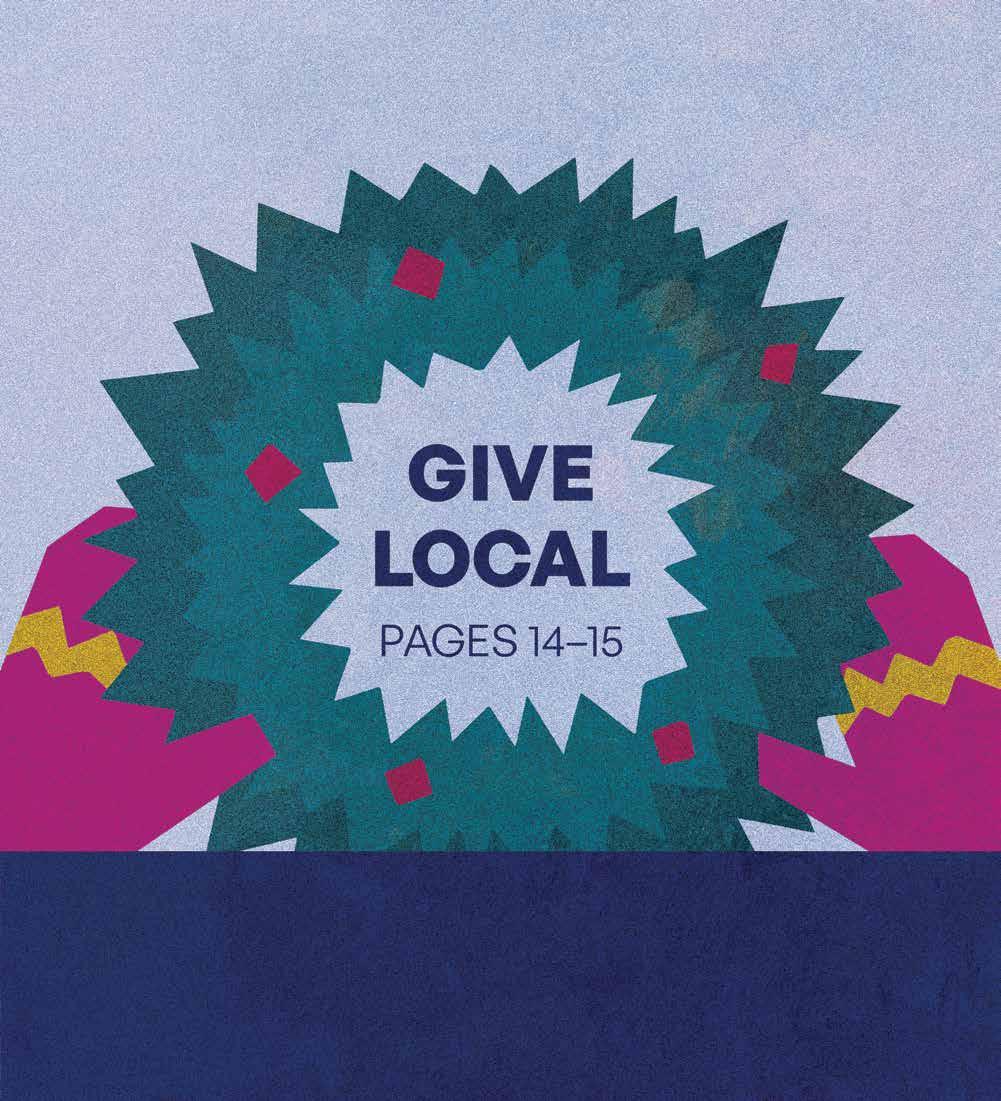




No man is an island.
This principle is especially true at The William George Agency for Children’s Services (WGA), where adolescent youth receive intensive, out-of-home treatment services for behavioral, mental health and substance use challenges.
“Youth accepted into a WGA program are in need of a highly-structured, therapeutic environment,” says Brian Gee, LMSW. “Every day we work with an extraordinary group of young people whose personal histories have included some of the most unthinkable experiences. An important part of my job is to see that young people leave WGA with tools and experiences they can draw from to know what healthy, well-balanced relationships look like.”
Gee predominantly serves youth and families living in the Northern region of NY and is one of a dozen Family Services Coordinators at WGA. Family Services Coordinators communicate with family members about their child’s progress while at WGA and work directly with a child’s family to create a supportive home environment that’s best suited for their child’s continued progress. “It’s in no one’s best interest, especially a child’s, to have an unstructured environment,” explains Gee. “Our goal is to strengthen and increase healthy family dynamics upon return to the community.”
“Our job as Family Services Coordinators is to keep families informed of how their child is doing while in program and to offer support,” adds Family Services Coordinator Julie Owens, LMSW. “Every situation and family is unique. Sometimes support means being a good listener at the other end of the phone. Other times its advocating for reunification in the Family Court system. One day I could be helping by driving someone to an important medical appointment. The next by bringing groceries to a family struggling to make ends meet.”
Owens mainly serves youth and families in the Rochester area and is the longest-serving Family Services Coordinator at WGA with more than two decades of experience. She and her colleagues regularly communicate with OCFS (Office of Children and Family Services), Probation Departments, Family Courts, School Districts, and other human service agencies in New York advocating for the best interests of youth.
It can be difficult to build relationships with family members at first, acknowledges Owens.
“Many have been dealing with chronic issues and crises related to their child for years before finally accessing the level of care and specialized support their child needs. Family Services Coordinators work to earn the trust of families so that they can better understand their role in the therapeutic process and manage their expectations,” says Owens. “Learning to relate to each other after so much has come to pass between family members can be really hard. We’re not here to judge. We’re here to support.”
Support means being aware of the different issues impacting different communities as well as being culturally aware.
It can also mean having difficult conversations with family members about the readiness of a home for a child’s return, says Michelle Wayman, a WGA Family Services Coordinator for the Buffalo region.

Most times it’s about, “meeting families where they’re at,” explains Gee, “getting them to understand they’re never going to get where they want or need to be if they focus on the past.”
Anne McKane, Director of Developmental Achievement Services at WGA, sees support as helping to ensure young people leaving WGA have the continuity of care they need and are eligible to receive.
“It can be a cumbersome and complicated process to navigate the programs available to youth with disabilities,” says McKane. “Family Services Coordinators are integral in navigating the referral process for any and all services, whether helping to chase down old records or finding the support families need to get their child to the next stage of adulthood. At the end of the day, our goal is to connect youth with services that will advance their highest level of independence.”
In all cases, Family Services Coordinators work to get the best possible outcome for young people returning to their community. One of Gee’s most satisfying moments was helping a young man track down and reunite with a supportive relative who had moved out of state.
“We don’t just want families to know that we will advocate for them. We want them to be part of the process working to make their child’s life better,” says Helen M. Hulings, Executive Director of The William George Agency. “When people feel they are part of something, when they feel heard, it leads to better decision-making, shared ownership and sense of success.”
The William George Agency for Children’s Services is committed to providing a safe and caring residential environment supported by proven, therapeutic, clinical and medical care for at-risk youth. For more information, visit their website: www. wgaforchildren.org.
By Philip O’Dell
The Ithaca Common Council approved $500,000 in stopgap funding for Tompkins Consolidated Area Transit (TCAT) during a Nov. 5 meeting in which city officials criticized Cornell University’s $31,000 pledge to the transit system.
The council passed the measure 10-1 vote, moving the money from the city’s fund balance into a restricted contingency fund.
TCAT General Manager Matthew Rosenbloom-Jones requested the $500,000 increase in the underwriters’ share, as the transit system faces a funding shortfall. He explained TCAT’s financing is structured like a “three-legged stool,” with funding shared among the City of Ithaca, Tompkins County, and Cornell University. The lowest commitment from any underwriter sets the base funding level for all of them. With Tompkins County already setting aside a potential $500,000 and the city council matching its own $500,000, Cornell’s latest $31,000 proposal drew criticism.
Mayor Robert Cantelmo called Cornell’s proposal an “abysmally low, embarrassing, unhelpful, austerity-minded, insulting, parasitic offer,” as well as “selfish and myopic.”
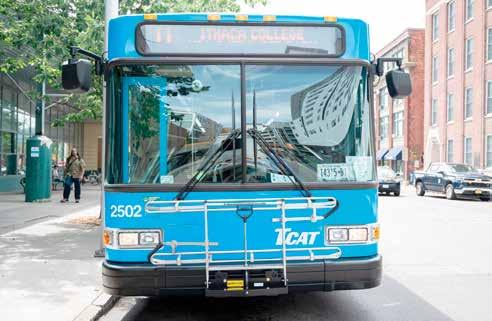
Cantelmo said the city’s $500,000 funding ceiling for TCAT is contingent upon a future council vote and Cornell University increasing its proposed $31,000 offer to ensure the transit system’s financial stability.
Alderperson David Shapiro said, “Cornell should be embarrassed by themselves,” while Alderson Ducson Nyugen called it
T ake n ote
By Philip O’Dell
Former
Ithaca Fire Chief Rob Covert was named the new deputy state fire administrator for the New York State Fire Commission.
Covert oversaw the department’s launch of an all-electric East Hill Fire Station. According to the City of Ithaca, the construction project boosts public safety and sustainability for residents.
Covert started his career with the Ithaca Fire Department in 1992, accumulating over three decades of service. While with the department, he continued his education, earning a Master of Arts in Security Studies in 2013 from the Naval Postgraduate School in Monterey, Calif. Covert was appointed as the city’s fire chief in 2023 and served in the role until his retirement this year.
“Chief Covert’s leadership has been instrumental in advancing our fire services and ensuring the safety of our community,” City Manager Deb Mohlenhoff said. “We extend our deepest gratitude for his extensive years of dedicated service to the City of Ithaca.”
Deputy Chief Michael Moody is now serving as acting chief. With nearly 20 years of experience, Moody will ensure a seamless transition as he continues the work of protecting local neighborhoods, the city announcement says.
’I am excited to step into the role as Acting Fire Chief of the City of Ithaca,” Moody said.
“Our firefighters are a highly skilled and dedicated team of professionals, and my role is to support their mission of protecting life and property. Together, we will continue building a progressive department that
“shameful and embarrassing” and said the university has consistently misunderstood TCAT’s financials. Alderperson Phoebe Brown said Cornell significantly utilizes TCAT services more than low-income residents, yet the city is left holding the financial burden.
Continued on Page 7

serves our community with the highest level of professionalism and care.”
Mohlenhoff said city officials are confident that Moody will continue Covert’s legacy of excellence.
r EE lanc E rs : Barbara Adams, G. M Burns, Charley Githler, Stephen Burke, Bill Chaisson, Ross Haarstad, Steve Lawrence, Marjorie Olds, Henry Stark, Peter Rothbart, Austin Lamb, Clement Obropta, Jake Sexton, Kira Walter, and Vasant Alex Laplam THE ENTIRE CONTENTS OF THE ITHACA TIMES ARE COPYRIGHT © 2025 BY PATHWAYS TO EQUITY, LLC. All rights reserved. Events are listed free of charge in TimesTable. All copy must be received by Friday at noon. The Ithaca Times is available free of charge from various locations around Ithaca. Additional copies may be purchased from the Ithaca Times offices for $1. SUBSCRIPTIONS: $139 one year. Include check or money order and mail to the Ithaca Times, PO Box 27, Ithaca, NY 14851. ADVERTISING: Deadlines are Monday 5 p.m. for display, Tuesday at noon for classified. Advertisers should check their ad on publication. The Ithaca Times will not be liable for failure to publish an ad, for typographical error, or errors in publication except to the extent of the cost of the space in which the actual error appeared in the first insertion. The publisher reserves the right to refuse advertising for any reason and to alter advertising copy or graphics deemed unacceptable for publication. The Ithaca Times is published weekly Wednesday mornings. Offices are located at 109 N. Cayuga Street, Ithaca, NY 14850 607-277-7000, FAX 607277-1012,
By Mark Syvertson
QUESTION OF THE WEEK:
“WHAT'S YOUR FAVORITE SUBJECT IN SCHOOL SO FAR THIS YEAR?”
NOTE: If readers wish to participate in the Ithaca Times’ Inquiring Photographer column, contact Mark Syvertson at marksyvertsonphotography@gmail.com

“I would say either P.E. or recess.”

I really like



“Does recess count as a subject?”
By Philip O’Dell
Tompkins Community Bank filed a mortgage foreclosure lawsuit in New York State Court against the developers of The Dean luxury apartment complex in downtown Ithaca.
Located at 401 E. State St., The Dean is a five-story, 47,285-square-foot building with 46 residential apartments and commercial space, the lawsuit states. Travis Hyde Properties oversaw renovation of the former Gateway Plaza office building — built in 1924 as a concrete warehouse — by updating its industrial framework.
Tompkins Community Bank filed a summons and verified complaint in the Supreme Court of Tompkins County on Sept. 4 against GPA Management, LLC, a business entity of Travis Hyde Properties. Other defendants listed include Andrew Frost Travis, the president of Travis Hyde Properties; Katherine Scoggins Travis, Elsa Hyde, Gateway Plaza Associates, and the Tompkins County Industrial Development Agency. The Syracuse-based law firm Bond, Schoeneck & King is representing the bank. In 2023, the Tompkins County Industrial Development Agency granted a standard seven-year Payment in Lieu of Taxes (PILOT) agreement to The Dean property totaling incentives worth $1,734,923, according to TCIDA Administrative Director Kellea Bauda. This total includes property tax, sales tax, and mortgage recording tax abatements of $1,210,007, $491,244, and $33,672, respectively. Over the sevenyear term, the project is expected to pay $1,190,029 in new taxes and $1,217,086 in base taxes for a total of $2,407,115, while a
$230,000 contribution was bestowed to the Community Housing Development Fund.
Tompkins Community Bank initiated foreclosure action against Travis Hyde for allegedly defaulting on its consolidated mortgage, which was executed in March 2023. The bank claims the company failed to make required loan payments, including interest, taxes, and insurance, starting in December 2024, leading to the acceleration of the entire debt. As a result, the bank asserts that the total outstanding mortgage indebtedness owed is now over $19.5 million, which includes principal, interest, a prepayment penalty, and late fees. The bank seeks to sell the mortgaged property, collect the full amount owed, and hold individual guarantors —Travis and Hyde, and corporate guarantors Gateway Plaza Associates — responsible for any remaining deficiency.
Andrew Frost Travis told the Ithaca Times that while Travis Hyde Properties does not comment on pending litigation, he said “no tenant will be disturbed no matter the outcome of the litigation.”
A legally mandated notice to tenants was posted on the property, informing residents of their rights under New York state law. The notice says tenants with a valid lease, and whose rent was not substantially below fair market value, are generally entitled to remain in occupancy for the remainder of their lease term. For tenants without a lease, the law permits them to stay for at least 90 days after the new owner provides official notice of the change in ownership. The notice says the rights of all rent-stabilized and rentcontrolled tenants remain unaffected by the foreclosure status. Any eviction in New York state can only occur pursuant to a court order

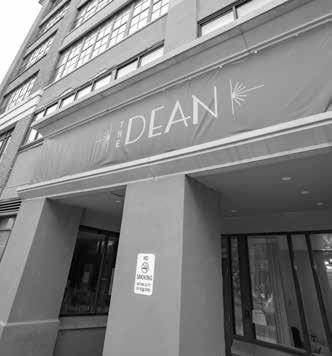
after a full hearing. The bank, located at 118 E. Seneca St., is reachable at (607) 274-8775.
Beyond the principal borrower, the bank’s complaint names several other entities and individuals who had personally guaranteed the massive debt. These guarantors, including Andrew Frost Travis, Katherine Scoggins Travis, Elsa Hyde, and Gateway Plaza Associates, are being sued for honoring their promise to cover the debt should GPA Management fail to do so. The lawsuit also includes two companies, Purcell and Matco, and a tenant, John Littlefield. The bank is petitioning the court for comprehensive relief to secure its financial interests. Their requests include: an order to foreclose on and sell the property to recoup the $19.5 million debt; the immediate appointment of a court-supervised receiver to take control of the building and collect rental income during the legal process; and, critically, a deficiency judgment against the personal and corporate guarantors. This last measure aims to hold the guarantors accountable for any remaining shortfall between the proceeds of the forced sale and the full $19.5 million amount owed to Tompkins Community Bank.
Travis Hyde and the four named guarantors jointly filed their formal answer to the bank’s verified complaint on Oct. 1. In their formal answer, the defendants say the bank hasn’t shown the court that it holds or possesses the official loan paperwork or the promissory note. Without proof, the bank isn’t the true owner of the debt and lacks the legal right to bring the lawsuit. The defendants formally ask the court to dismiss the lawsuit and make the bank pay their legal costs.
By Philip O’Dell
The Ithaca Common Council passed the 2026 city budget at its Nov. 12 meeting. Totaling $111,458,496, the budget is roughly a $4.7 million increase from last year’s.
The tentative budget passed on Oct. 6 was originally higher at $112,893,913. This budget season became tumultuous after a staff error resulted in an unexpected $2.1 million shortfall in the tentative budget.
The council approved a stopgap package and six amendments to the proposed budget to close the revenue gap at its Nov. 5 meeting. The amendments and final calculations result in a 4.11% increase in the tax levy.
The approved budget totals $76,685,914 in revenues and adjustments, while requiring $34,772,582 in property taxation. The certified 2025 Assessment Roll, approved by the Assessment Department of Tompkins County, establishes the total net taxable valuation at $2,839,963,647.
The 2026 tax rate was set at $12.24 per $1,000 of taxable valuation, resulting in a total tax levy of $34,772,582.
To fix the shortfall, the council eliminated free street parking on Saturdays to raise $85,000 and enacted Saturday garage parking to generate $110,000. Garage rates were to $2.25 an hour to produce $127,000 in revenue. The city’s website says onstreet parking costs $1.50 per hour and is enforced from 9 a.m. to 6 p.m., Monday through Friday. The hourly rate for the Green Street, Seneca Street, and Dryden Road garages at $1 per hour, while the Cayuga Street Garage charges $2 per hour.
Alderperson Pierre Saint-Perez expressed concern that the anticipated Saturday parking revenues might not materialize and could have “unanticipated consequences.” However, he said the city’s financial situation left no choice but to authorize the measure.
Alderperson Tiffany Kumar voiced support for the new parking fees, stating they align with the city’s goals of promoting sustainability, climate initiatives, and increasing downtown business access and turnover. Kumar said other cities, such as Burlington, Vermont, and Ann Arbor, Michigan, implemented similar fees and saw improved compliance with parking regulations and increased commerce. She
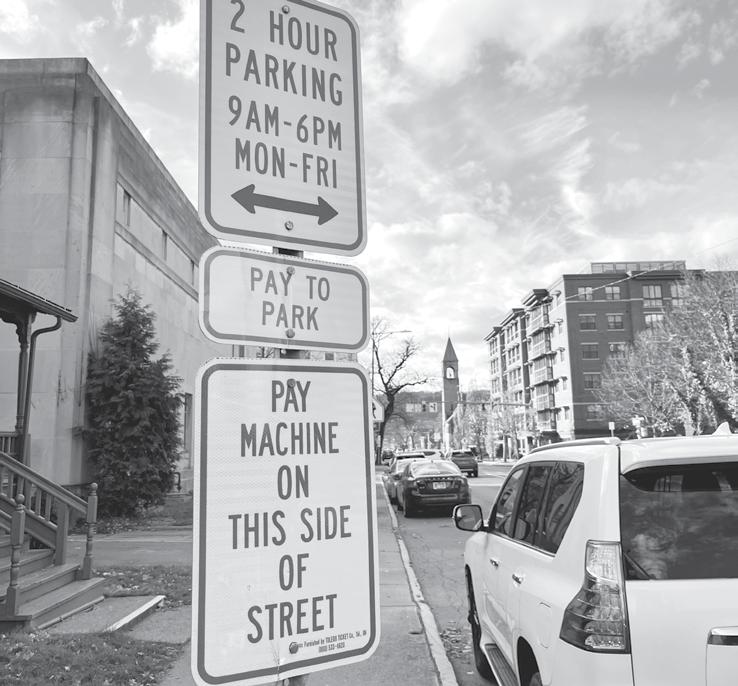
said the new rates reflect the true cost of infrastructure, keep up with market demand, and improve equity in transportation spending.
The stopgap package totaled $2,379,699 and includes multiple reductions, such as $145,000 in line reductions for the Department of Public Works (DPW), $10,000 in line reductions for the Ithaca Fire Department related to dispatch room renovations, and a $20,000 reduction in Office Expense and Advertising for IPD. Citywide reductions include $10,450 for phones and $10,000 for advertising, excluding police.
The budget for unemployment insurance was lowered by $5,000, and the workers’ compensation allocation was reduced by 10%, resulting in savings of $123,694. Officials set aside $50,000 for technology reserves while making reductions of $100,000 to emergency reserves for bridges and $400,000 to the Emergency Repair Fund. Additional savings included the Vacancy Rate set at 5.5% ($247,500), reducing management increases to 1% ($76,648), applying an Over Target Request Differential ($354,478), and an adjustment to reach the Tax Cap of 4.3% ($269,665).
Approved amendments included elimi-

The New York Landmarks Conservancy has announced 15 Sacred Sites Grants totaling $244,500 awarded to 15 historic religious properties throughout New York State, including $7,500 to the First Baptist Church in Ithaca to help fund stained glass restoration.

Ithaca police arrested 47-year-old Michael D. Jones Jr. on Nov. 14 after officers responded to a burglary in progress on East State Street and found him inside a business with a damaged door, charging him with third-degree burglary and resisting arrest.

The Paleontological Research Institution (PRI) has donated Smith Woods in Trumansburg to the Town of Ulysses, ensuring the 32-acre oldgrowth forest remains protected and open to the public.

Last week, employees at ITT’s Seneca Falls facility collected a large donation of food, clothing, and 50 Thanksgiving turkeys for the Seneca County House of Concern, supporting local families experiencing food insecurity.
nating the ability to acquire General Fund items through capital borrowing, though this does not impact revenues or expenses. An additional $15,000 was allocated to the Tompkins County Public Library, while DPW saw a $8,000 increase. TCAT was allocated $500,000 that will be placed in restricted contingency and drawn from the fund balance.
Alderperson Kayla Matos was the sole dissenting vote on the budget. She disagreed with this year’s budget process and opposed the lack of funding for unarmed responders.
“I don’t agree with a lot of the way that this budget was built out,” Matos said.
On Nov. 12, the council voted 9-1 to eliminate a vacant DPW assistant supervisor of streets position, freeing up $115,697.
Mayor Robert Cantelmo said Alderperson Margaret Fabrizio’s original motion sought to correct a “procedural misunderstanding” that had previously defunded a proposed but unfunded parks manager position instead of the existing vacant DPW role intended for repurposing. Fabrizio said the city should support existing programs
IF YOU CARE TO RESPOND to something in this column, or suggest your own praise or blame, write editor@ithacatimes. com, with a subject head “U&D.”
Do you plan to donate to local non-profits during the upcoming holiday season?

Do you agree with the eight Democrats who decided to vote with Republicans to end the government shutdown? Visit ithaca.com to submit your response.
By Philip O’Dell
Ithaca residents celebrated National Immigrants Day by sharing personal accounts at the recent Immigrant Stories Open Mic event. Story House Ithaca, Catholic Charities Tompkins/Tioga and the Immigrant Solidarity Group hosted the event at Komonz Grill on the Ithaca Commons.
Yusuf Uğurer, a professional singer and music teacher from Turkey, moved to Ithaca with his wife as she pursues a doctorate at Cornell University. Now in his second year, he feels more comfortable and familiar with the city. He said learning a new language and adapting to a new culture was hard at first, describing it as being stuck in his own mind. He felt alienated and lonely before making friends at the Open Doors English program that provides English classes. He said education is his purpose and looks forward to enjoying Finger Lakes wines next summer. Uğurer also sang an operatic song in his native language that received applause.
“We are living in a beautiful city of generous and kind people,” Uğurer said. “I try to understand and assimilate myself into a new life. To live in a different country made me sharper, I think. Everything is a new experience, and I have more and more patience and resilience now.”
Fumina Iizuka opened her speech dedicated to her unborn child with the words,
“Dear baby in my belly,” drawing awes from the crowd. She was nervous about her new life in Ithaca and struggled with the language barrier. Iizuka recalled one difficult medical visit that took two hours to complete paperwork, leaving her feeling mocked by individuals there. Despite this tough experience, she found support through the ODE, where she learned English and made lasting friendships. She now discusses Japanese literature in English with her peers. Iizuka credits one fellow student who is passionate about Greek literature as the reason her baby will have a Greek middle name. Her baby's first name will be associated with water, because the child will be born in Ithaca, an area rich in waterways.
“Now my new friends are looking forward to seeing you. Please come out as soon as possible,” Iizuka said.
Tania Werbizky spoke of her grandfather, Gregory, a Russian born in 1885 in Ukraine. He fought for the anti-communist White Army during the Russian Civil War in 1917 and later fled after its defeat by the Red Army. He settled in Yugoslavia, where he married her grandmother Sophia and started a family. When the Germans invaded in 1941, they fled again to a refugee camp in Austria.
In May 1945, Gregory was separated from his family and forcibly repatriated to the Soviet Union during Operation Keelhaul despite never being a citizen. He

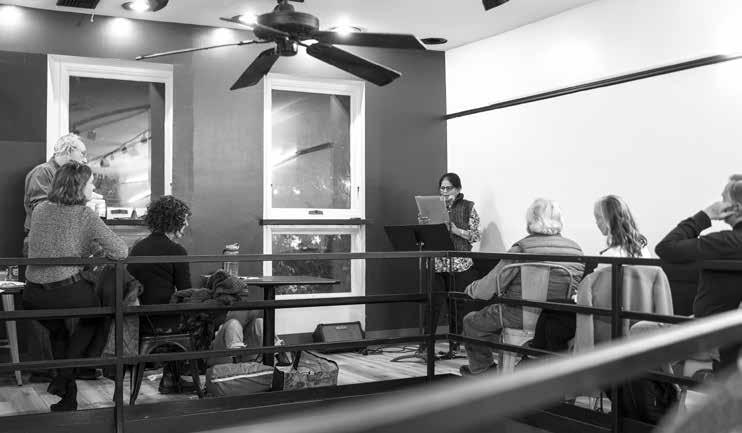
was sent to a gulag, a forced labor camp in a coal mining region, leaving his family with no knowledge of his whereabouts. The family emigrated to the United States in 1949. Gregory was released from the gulag system, along with thousands of others, as part of Soviet leader Nikita Khrushchev’s de-Stalinization policies in 1953. He worked in a Soviet village laundry and wrote to a former neighbor in Yugoslavia. Unbeknownst to him, George also corresponded with the neighbor, who confirmed to both that they were alive.
“It became my father’s mission in life to reunite the family,” Werbizky said.
Gregory was trapped in the Soviet Union, lacking official documents or a passport. George, an IBM engineer in 1955, wrote directly to the company president for assistance. This led to correspondence with three U.S. embassies who helped reunite father and son in November 1956. Gregory spent his remaining years in California with his sister, where he rejoined the Russian Orthodox Church and cultivated gardens—including an acre of avocado trees—before his death in 1966.
Twins Jayne DeMakos and Yvonne Fisher shared their personal stories during the event held on their birthday.
As a music thanatologist, DeMakos works with patients at the end of life. She once soothed a Jewish woman who was a Holocaust survivor. Because her own mother grew up in Nazi Germany, DeMakos felt a profound connection. She used her harp to match the patient’s breathing, playing a slow, gentle melody that followed its natural “ebb and flow” to offer comfort and healing.
Fisher shared an excerpt of her show where she portrays both herself and her
mother. She spoke of her mother’s childhood in Vienna when the Nazis took over. Neighbors threw rocks, broke windows, and pulled her family from their home one night. They were forced to wash the ground on their hands and knees—a public act of humiliation—before the Nazis seized their home. Her grandparents were killed by the Nazis, while her mother, aunt and uncle escaped to England and found work as servants. Her mother also survived the German air raids on Britain in 1940 and 1941, known as The Blitz.
Ilu Wloch, who arrived in the U.S. from Poland at age 13, has channeled her family’s history into activism, launching the publication Positive News to champion social justice and change. Her father’s activism in Poland led to his imprisonment and the family’s passports were withheld briefly before they ultimately left the country to avoid further political persecution. Now, through her publication and work with other activists, Wloch seeks to promote those who are making a positive difference. Ramya Herath immigrated to the United States from Sri Lanka when her husband accepted a position at Cornell University. In her home country, she was an experienced teacher and school counselor, having taught at a high school with 5,000 girls and enjoyed a supportive community of friendly teachers. After moving to the U.S., she initially felt isolated and struggled with the language barrier. Her solution came when she enrolled in the ODE program, which became a second home and helped her overcome the barrier.
“From that moment my world started to expand,” Herath said.
Mariia Tsyhil arrived in Ithaca from Ukraine in October 2022 to join her
sister’s family after an 18-year separation. She is happy to live in Ithaca’s peaceful environment, free of warfare. Tsyhil enjoys the local tranquility, volunteering at the ReUse Center, and spending time at natural landmarks like the waterfalls and Cayuga Lake, where she likes to swim in the summer.
José Tzul said being an immigrant can be hard, lonely, and sometimes sad. While the future is unexpected, faith and hope keep him going one day at a time. He said
it is difficult “when politics are against you.” Tzul ultimately found that hope within the Ithaca community, affirming he never felt rejected. He said local people genuinely desire to assist, “not because of their job but because they want to help me.” He specifically thanked ODE teachers for creating an environment that feels “like home and family.”
“I’m so lucky to find this beautiful place and grateful to know these people who are gentle and respectful,” Tzul said.

continued from page 5
rather than fund a new position while facing financial constraints. The council also voted 9-1 to reallocate $50,000 of those funds to Second Wind Cottage’s violence interrupter program and the other $65,000 for the downtown community outreach worker program—a partnership with Tompkins County and the Downtown Ithaca Alliance. Matos cast the dissenting vote on all three motions.
Saint-Perez said he voted for the budget’s approval to avoid implementing the previous version with the $2.1 million shortfall. He encouraged the council to amend the budget as needed over the coming year.
“I actually do share a degree of lack of faith in this budget. I don’t think it’s a great budget,” Perez said. “I will be voting for it because the alternative is a significantly worse outcome.”
Alderperson David Shapiro said he was “still on the fence“ before voting in favor of the budget. He disagreed with decisions made after the revenue gap was identified. Shapiro felt the community
continued from page 3
Alderperson Margaret Fabrizio was the sole nay vote against setting aside the $500,000, voicing concern that city residents are already contributing to TCAT twice as city and county taxpayers. She questioned if the city would simply be asked for millions more next year. She called for a more sustainable, long-term solution, possibly by bringing in outside experts to work with TCAT.
“I think we have an unsustainable system right now, unfortunately, and I think that the ask amounts to putting a band-aid on a very large wound,” Fabrizio said.
In a statement to the Ithaca Times, a Cornell University spokesperson confirmed the institution is communicating with Tompkins County and the City of Ithaca regarding underwriter contributions to TCAT.
being split evenly among the three underwriters as stipulated by the transportation agreement. Rosenbloom-Jones said there could be multi-million-dollar losses by 2028 based on some budget projections.
Rosenbloom-Jones argued the $500,000 ask would establish a new, smaller, and more predictable baseline for future funding requests, helping TCAT navigate high costs like electric buses, which run over $1 million per vehicle, and preserve its current $8 million cash fund balance.
Rosenbloom-Jones said failure to address the deficit with the requested $500,000 would cause the budget gap to grow, leading to larger, less predictable funding requests in the future. He explained that under the current transportation agreement, TCAT cannot hold debt. An unresolved annual deficit or loss is split evenly among the three underwriters. He said these losses could be in the “multi-millions” by 2028.
was not given enough time to discuss final choices like parking changes and disliked the lack of funding for the emergency repair fund.
“It just feels like this is a budget that very easily was able to trim $2 million and at the same time not be responsive to all the needs in the community,” Shapiro said.
Fabrizio said the current process was an improvement over the previous year—the approved 4.11% tax levy increase translated to only a 2.75% tax increase compared to last year’s 8% levy—but still needs to be improved. She said the city needed to make deeper cuts to ensure affordability for residents, while vacant positions need to be reviewed.
“I don’t think the fiscal health of the city is in better shape,” Fabrizio. “I just don’t think that we are on a sustainable track.”
Kumar voiced disappointment regarding the lack of unarmed responder funding but committed to voting for the budget to meet the necessary deadline. The City of Ithaca’s Charter says Nov. 15 was the final date for the council to finally adopt its budget.
Cantelmo said the council had a fiduciary responsibility and requirement under New York state law to pass a balanced budget.
“From the beginning it has been important to Cornell that any agreement should be something that delivers positive results for TCAT riders,” the Cornell spokesperson said. “Tompkins County, the City of Ithaca, and Cornell, have recently been engaged in fruitful conversations about how to ensure any contributions made by the underwriters, above and beyond the $6.3 million already paid, lead to improvements in reliability, cost control and, ultimately, increased ridership. These will be key drivers to put TCAT on a path to solvency.”
Rosenbloom-Jones said TCAT is in an “unprecedented situation” financially as American Rescue Plan Act (ARPA) and Coronavirus Response and Relief Supplemental Appropriations (CRSSA) funds run out. He said the shortfall requires an immediate increase in the underwriter share to maintain current service levels. Operating costs that include labor, oil, and gasoline have increased since 2019, while underwriters’ shares have remained flat, creating a critical budget gap.
Rosenbloom-Jones said possible system-wide cuts would include reductions in operating hours and days of the week. Rosenbloom-Jones said failure to secure funding would lead to service cuts, initiating a “death spiral” of reduced ridership, a further drop in operating revenue, and more service cuts that would impact residents with disabilities and low-income, job access and local sales tax revenue.
If unaddressed, Rosenbloom-Jones said the deficit will grow and lead to larger funding requests in the future. Failure to secure the necessary will lead to the deficit
He said TCAT’s strategy is to “grow our way out, not cut our way out,” aiming to increase ridership by 15% and increase other revenues to avoid this undesirable three-way assessment.
Lederman said TCAT is on track to surpass 3 million riders this year—a post-pandemic record—for roughly $20 million, which he called a good return on investment. He added that only about one hundred cancellations out of 20,000 TCAT trips ran in September.
TCAT Chair Laura Lewis said TCAT is crucial for local economic vitality as it transports residents to work, medical appointments, school and shopping. She said building ridership requires dependable, reliable, and expanded service, which in turn boosts TCAT revenue, city sales tax, and job access. Lewis stressed that now is the time to build upon the agency’s recently stabilized staffing levels to secure these benefits.
“While there are financial strains and uncertainties for all of the underwriters, I believe it is critical to sustain transit as a public service,” Lewis said.
Lewis also detailed the significant financial pressures TCAT faces. These include increased operational costs across labor, healthcare, fuel, gas, and electric, along with maintenance for an aging facility originally built in 1992, and uncertainties surrounding federal and state support. She highlighted the immediate need to replace engines in ten older TCAT buses to extend their service life. Lewis concluded that TCAT must maintain a healthy, reasonable fund balance for unexpected needs, especially since the fund balance, once depleted, cannot easily be replenished.
The Talk at
United States Abandons UN Climate Change Conference
“Right now, in Belem, Brazil, the COP30 (UN Climate Change Conference) is happening. One of the largest carbon polluters, our United States, has no representative attending. Our President has dubbed the climate catastrophe a “con job.”
Right now, at Buffalo Street Books is a newly published book that throws sunlit hope on this bleak US response to the global crisis. Bill McKibben writes in Here Comes the Sun, “We’re quite suddenly at the moment where, as a species, we could and should break the habit of burning things.” He shares exciting news of breakthroughs in solar energy that, he concludes, could stop global warming “short of the place where it makes civilization impossible.”
COP30 is flooded with fossil fuel lobbyists. Let’s flood Congress with demands for keeping fossil fuels in the earth and focusing sunlight on increasingly effective
solar collectors. We owe it to our children and grandchildren.” — Ruth Yarrow, Ithaca NY
Shutdown
“I know many are disappointed about the Democratic failure to maintain the shutdown. I am also dismayed. The cost of access to healthcare will skyrocket for millions of Americans in January. Still, the position of those of us fortunate enough to have healthy incomes with enough left over for travel and to enjoy retirement (I count myself among them) means we were largely immune from the shutdown except for possible hassles about flying.
Senators Shaheen, Hassan of New Hampshire and Senator King of Maine must have been acutely aware that the roughly 6,000 employees at the Portsmouth- Kittery Naval Yard were facing a bleak holiday season. In Upstate New York where the average income in some of our neighboring counties is $24,000, food banks and soup kitchens could not fill the gap created by the absence of SNAP. The situation was becoming desperate. It is too easy to blame Democrats who faced a Hobbesian choice. Let us be clear. The people responsible for this are Trump and the Republicans who chose to bludgeon the most needy among us to end the shutdown. They passed the ugly Bill last

spring which cut services to fund tax cuts for billionaires and to fund ICE.
The only way out is to concentrate like a laser on taking back the House and Senate. Can you imagine three more years of total Republican power in DC?
I will respond by doing all I can to replace congressional Republicans with Democrats and to keep Congressman Riley in office.” — Ann Sullivan, Ithaca NY
“When I read the article on the proposed Data Center on Cayuga Lake, I remembered a proposal, in the late 1960s, to build a nuclear power plant on Cayuga lake, at the current power plant site, formerly known as Millikan Station. It was to be called ‘Cayuga Station Number 1’.
The lake’s depth would be the source of very cold, and nutrient-rich, water for cooling the nuclear reactor in a closedloop process. In this process, the water from the lake would never be in contact with the radioactive materials in the reactor, but it would be significantly heated. The heated, nutrient-rich lake water would then be returned to the surface of Cayuga Lake.
One of the many concerns voiced back then was that the heated nutrient-rich water would create a significant algae bloom on the surface of the lake, complicating the use of lake water as a source of drinking water and harming the lake’s ecosystem.
Local groups were very active in presenting scientific and legal arguments against the proposed nuclear power plant.
Cayuga Station Number 1 was never built.” — John W Schwartz, Richford NY
“On November 7th President Kotlikoff sent a message to the Cornell community announcing the completion of an agreement with the Trump administration which would release impounded research funds. The message emphasizes that the agreement affirms “the university’s commitment to the principles of academic freedom, independence, and institutional autonomy...”.
However, no matter how nicely rationalized, Cornell’s deal is capitulation. Although dressed up in a useful agricultural initiative ($30 million) and an arguably nuisance value payment ($30 million) in comparison to other universities, the non-economic terms of the agreement include some serious traps. Here I highlight three, in paragraphs 18, 9 and 6 of the agreement.
Specifically, paragraph 18 expressly authorizes routine record mining and data sharing with law enforcement of all manner of personal information about students and their applications, under the auspices of Title IV compliance. Title IV of the federal Higher Education Act is a student aid law. It oversees a number of programs that, combined, are the largest source of financial assistance for university students. Under the law, an applicant’s personal data that are submitted in the Free Application for Federal Student Aid (FAFSA) generally may not be redisclosed to any person, institution or government entity without the express written consent of the applicant. However, in paragraph 18 of the agreement, Cornell preemptively gives up without

“If
— Carl Sagan, Cosmos
By Stephen Burke
For its first three years operating a weekly free food pantry in the Henry St. John building downtown, No Mas Lagrimas/No More Tears was easy to overlook. Now it’s hard to miss.
The Henry St. John building is a reconverted school building, like its better-known counterpart, the Dewitt Mall, which houses Moosewood Restaurant, Buffalo Street Books, Ithaca Guitar Works, a branch of GreenStar Co-op, other businesses, and apartments.
Henry St. John has apartments and some office spaces, but no prominent public businesses. It is not quite as central to commercial and civic activity as the Dewitt Mall, but is only a few blocks from the heart of downtown.
Unlike the Dewitt Mall, Henry St. John has free parking around it. This is an attribute for a free food pantry, although most people walk.
The pantry operates on Thursdays from 4-7 p.m. Until recently, the only real sign of it was a blackboard stand placed by a building door reading “Free Food,” with an arrow. The people visiting were few enough to be practically unnoticeable entering and exiting.
Then in October the Trump administration announced it would cease benefits for the Supplemental Nutrition Assistance Program, which 42 million low-income Americans rely on for buying food.
The government shutdown was given as a reason, but was seen by many as a pretext from Republicans who have long sought to undermine the program through punitive legislation.
Now there is a line at the entrance to No Mas Lagrimas, dozens deep.
In the line on the second Thursday of SNAP’s shutdown, political talk was wideranging. Indications had come from Washington that the program would resume soon, at least partially, but there was a sense more of betrayal than trust. A woman there for her family of four spoke not of her own need, but of the ramifications of the cut-off for the American economy.
“Don’t they realize that at least 15 percent, sometimes 50 percent, of grocery store sales are through SNAP? What happens to those businesses? And the distributors and the farmers? Don’t they

realize that wealth trickles up, not down? It’s not even logical, forget about humane.”
Inside, a dozen or so workers stocked canned goods, bread, beans, pasta, produce, eggs, aseptic packs of milk and juice, and tubes of ground beef. The atmosphere was energetic but cool. The leader is Ana Ortiz.
Ana started No Mas Lagrimas at her home in West Village. It grew and moved to a semi-enclosed space in the West End, and grew further and moved to Henry St. John.
No Mas Lagimas is a 501(c)3 with mainstream supporters such as United Way, but also progressive ones such as Indivisible Tompkins. It has the feel of a community enterprise.
“I’ve done community work for 20 years,” Ana said. “This is a working crew.” She nodded towards workers loading shelves with cases of inventory. “Carrying boxes, that’s the real thing.
“We’re community based. Everyone comes from a different background.
“We create a team. We got past Covid. We’ll get past this now,” she said of the SNAP situation.
“I say okay, do not panic. Let’s figure it out. Do not give up.
“We create something emotional,” she said, waving her arm toward the clearly dedicated workers.
Sometimes the duties of leadership bring frustration. Ana mentions complications of bureaucracy sometimes with support she seeks.
“I say, you know who we are. I have to beg, when we’re feeding people in crisis? I need people, money, equipment. I’m sorry to sound tough, but people are depending on us.”
She can sound tough, with language sometimes more of the Bronx streets where she grew up than of boardrooms. But in conversation she will also use guileless expressions like “Holy macaroni.” The workplace is cheery and affectionate. “We spread the love,” Ana said.
Ana regards No Mas Lagrimas as a place not just of community assistance but of individual empowerment, hence her dedication to and from the staff.
“I want people to be free, to use their talents. I tell them, if we don’t make a change, this will be the future.
“I say, you have a talent? Bring it here. We’ll spread the love.”
By Roy Allen, Director of Strategic Partnerships — Ithaca Times, Finger Lakes Community Newspapers, www.ithaca.com
There is a certain hush that comes with autumn, a quieting of the world that nonetheless feels full—full of color, of change, of purpose. Through the wonders of cell phone technology, my daughter-in-law sent pictures from Texas last week of my grandchildren racing across the yard, arms wide, trying to catch the first falling leaves before they touched the ground. They laughed with that reckless, wholehearted joy only the young possess, treating every crimson maple leaf like contraband treasure. Watching them, I felt something older than nostalgia stir in me: the recognition that these small hands are already reaching for what my generation must now willingly release.
We Boomers were handed a nation at its peak—prosperity most of the world could only dream of, institutions that (for all their flaws) still commanded respect, a culture that believed tomorrow would be better than today. We spent decades convinced the music would never stop. We borrowed against the future, congratulated ourselves for our tolerance while quietly hoarding the ladders we had climbed, and told ourselves that “having it all” was the same thing as building something that would last.
Now the leaves are turning, and the wind is shifting. Our mortgages are paid, our résumés long, our bodies sending unmistakable memos that the season is changing. And too many of us are clutching those bright years like children who refuse to open their fists, afraid that letting go means we never mattered at all.
But look again at the yard in Texas. Those grandchildren are not waiting for permission. They are already claiming the ground we walk on. One day they will inherit the debts we ran up, the institutions we neglected, the environment we treated like a piggy bank, the republic we swore was “too big to fail” while we spent its moral and fiscal capital. They will not ask whether we meant well. They will only ask what we left them strong enough to carry.
My generation still holds most of the wealth, most of the political power, most of the cultural megaphones. That is not a boast; it is a deadline. Every year we

postpone the handoff—every year we treat retirement as endless adolescence, every year we vote like the future is someone else’s problem—is another year the soil grows thinner for the roots trying to break through.
I have a family member whose seasons are growing short. She is not raging against the dying of the light; she is busy tying up loose ends, telling the stories one last time, making sure the people she loves know exactly where the important papers are kept. There is no self-pity in her, only a fierce clarity: love is not love until it is given away. She is teaching the rest of us, without meaning to, what courage actually looks like when the hourglass flips.
That is the model. That is the assignment.
To every Boomer still pretending sixtyfive is the new forty-five: the children chasing leaves today will be paying your Social Security before you know it. They will be deciding whether your nursing home has heat. They will be repairing— or abandoning—the Constitution you treated like a prop in a culture-war play. The only question left is whether we will spend our autumn making their inheritance heavier with resentment, or richer with possibility.
Letting go is not surrender. It is the final and most difficult act of stewardship. It means stepping aside in boardrooms and city councils and Senate seats. It means mentoring instead of gatekeeping, funding instead of filibustering, listening when we still want to lecture. It means admitting that the country was never ours to keep—it was only ours to improve and pass along.
The leaves fall so the tree can rest, but also so the ground can be fed. My sister’s stories, her kindness, the stubborn grace with which she faces winter—these are the humus she is leaving behind. If we do this right, our legacy will not be the size of our portfolios or the loudness of our opinions. It will be the strength we gave the young to stand taller than we ever did. So I watch my grandchildren leap for leaves they cannot possibly catch, and I
By Chloe Asack, Opinion Intern
It’s easy to believe that cellphones are just tools. Tools are for our convenience, like a screwdriver for a clogged drain or a pressure gauge for wonky driving. Whatever their benefits, both cellphones can no longer be classified as such for all the ways that they so deeply inconvenience us. Many have experienced some sort of phone-related inconvenience: someone running into you while glued to their device, anxiously waiting for the ticket inspector because your phone is about to die, or most insidiously, the collapse of valuable social customs.
Each individual practice of these customs had just a small positive effect, but now that they are slipping away, our culture is changing for the worse. The diminished attention spans, the social ineptitude, and the phantom phone signals are not just bugs of technology, but the reality that we need to address.
At least, Governor Kathy Hochul thinks so. In announcing her statewide phone ban, Governor Hochul said that “young people succeed when they’re learning and growing, not clicking and scrolling.” I spoke to local teachers to see if they really find this to be the case.
The question of the role technology ought to play in our lives is a polarizing one. Among teachers however, there seems to be a consensus that phone usage has adversely altered their classrooms. Lauren Norkus, an Ithaca High School teacher, said that a couple years before the ban she would tell students, “I just want you to turn and talk to your neighbors
LETTERS TO THE EDITOR
from page 8
a fight any challenge to a subpoena issued by the Secretary of Education for a broad array of data including “information, documents, reports, answers, records, accounts, papers, and other documentary evidence pertaining to participation in any program under Title IV”. Then, Cornell submissively “understands” that the Secretary may share such records with
about anything at all. Just don’t gather by the door and stare at your phones. And inevitably, that’s what they would do, because they didn’t know how to do anything else.”
Teachers are beginning to see differences post-ban. Cait Rejman, a Southern Cayuga High School teacher, sees it in her study hall: “Last year, every kid was just sitting on their phone. Now, they talk to each other, and that’s something that I didn’t realize was missing until this year, now that they're forced to interact face-to-face.”
The greatest pushback to cellphone bans has been the parent coalition. Their most salient argument is that they must have access to their children during an emergency. While this concern is sympathetic, many emergency response experts contend that cellphone use is to the detriment of emergency procedures. Ithaca Teachers’ Association president Kathryn Cernera agrees.
“Last spring, we were meeting a lot of resistance on this phone ban from caregiver groups talking about school safety,” Cernera said. “It was actually the police unions and the public service unions that handle emergencies coming forward and saying that ‘in a worst case scenario, every student getting on their cell phone would make our jobs harder,’ that got this ban over the finish line.”
Another reason that parents oppose blanket bans is because they are accustomed to having unrestricted access to their children. Now that our culture makes it possible for parents to check in on their kids at all hours of the day, many relish in the comfort of constant communica-
other governmental agencies including “law enforcement”.
Paragraph 9 not only includes an anonymized data reporting requirement (i.e. data that are stripped of all personal identifiers), but also subjects all admissions data (i.e. including non-anonymized data) to “comprehensive” government audit. In other words, all admissions data, including personal identifiers, essays (many of which describe deeply personal life challenges), third party letters of reference, etc. will be swept up
tion. But for every parent who used their access line to find the pick-up spot with ease, there is another placing inordinate domestic responsibilities on their child. The ubiquity of phones has eliminated the possibility of adolescents getting a break from their family lives in school. Perhaps with blanket bans, that may change.
Why weren’t districts regulating phones before Hochul’s ban? It’s not as easy as it sounds.
“Schools have tried to take it on themselves. But what always became the real sticking point was consistency of expectation,” Cernera said. “A lot of our students have their friends from dance, friends from soccer that don’t all go to the same school. So when every school has the same expectation, that pressure to join the group chat isn’t there.”
Some argue that in our rapidly technifying world, they must prepare their students to use their devices effectively. But for today’s students, technology is their first language. “They’re still all very tech savvy, so I think they’ll be fine communicating in a world that is so tech-based,” said Rejman.
However, the wider battle about adolescent phone usage goes beyond the schools. Some have pointed to a recent study to argue against phone bans because they do not reduce overall screen time or lead to better test scores. But learning better does not only mean better grades. It can also mean better class discussions and student attention, which is just as important, albeit less quantifiable. What these results do indicate is that to combat broader adolescent phone
into the government data banks for who knows what improper purposes. Given the track record of the current federal administration, its promise of confidentiality is meaningless.
The training “Guidance” requirement in paragraph 6 is ambiguous and misleading. It references a 9-page Justice Department memorandum that was issued in July 2025 by Attorney General Biondi that upends more than 50 years of evolution of the laws and regulations that protect our civil rights, claiming that its edicts

addiction, there will have to be parental regulation.
Kimberly Kopko is a Cornell University Senior Extension Associate who studies child development and parenting. With phones being such a new phenomenon, she finds that parents are overwhelmed with the amount of advice for regulating child phone usage. She’s found that parents want “just one page of resources to rely upon. They don’t need more, they need fewer, reliable resources,” which is difficult because research on phone usage is far from settled. “There’s a lot that parents don’t know about what their youth are doing online, and they’re looking for guidance,” says Kopko. For now, she encourages parents to broach the subject: “When parents can have conversations with their youth around social media use, sometimes that’s very effective, because the youth also don't know what the research shows.” In order to limit adolescent social media use in a broader context, parents will have to treat it as a problem.
But right now, over at Ithaca High School, Cernera’s office window looks onto a lawn where many students take their lunch period. Where she used to see students on their phones, now she sees them “playing cornhole and lawn games, interacting with one another, laughing, being social, being teenagers in a really beautiful, collaborative, communitybuilding way.” The future of adolescent phone usage is still uncertain. But in New York, we’ve decided that cellphones don’t belong in classrooms. In Ithaca, students are starting to reap the benefits.
are “Best Practices”. Its very ambiguity and “Best Practices” labeling chill any contrary criticism out of concern for on-going scrutiny and intrusive claims of non-compliance.
The bottom line is that Cornell is trying to appease the bully. It has missed an historic opportunity to emerge on the world stage as a principled leader of academic freedom and the rule of law — a much sounder investment in its long-term prestige and institutional security.” — Raymond Schlather, Ithaca NY



By Steve Lawrence
If ya know, ya know... I crossed paths with an acquaintance as the 66th annual Cortaca Jug was about to get underway, and that guy’s companion asked me if I had a son on either team. Nope. The other guy told him that I was a sports writer, and he said, “Oh, so you were assigned this game, on a windy, wet and cold Saturday?” Nope.” The guy replied, “I don’t get it, I’d be home on my couch if my nephew wasn’t playing.” Fair enough. Soon thereafter, I saw a fan of my vintage — bundled up in a red jacket — standing alone along the fence, so, like the guy in the Progressive commercial, I just started talking to him. “I’m Steve...Did you go to SUNY Cortland?” “I’m Ron. Yes, 50 years ago.” Did you play football?” “No.” “Relative on the team?” “Nope. I just love the atmosphere, so I drive down from Syracuse every year to watch it.”
A 90 minute drive, a 20 minute walk from the parking area, packed in like one of 8,000 sardines in a can, just because the game is such a spectacle. Yes... if ya know, ya know.
My next conversation was with a guy in a blue Bomber jacket, and I told him that his loyalties were clear. “Damn straight,” he said. I played in this game in ’91 and ’92.” I told him that ’92 was the first year I covered the game. He said, “Well, I am now 56 years old, and a retired grandpa.” Wow... Life’s game clock is ticking.
I love these games because there is so much emotion and so many story lines. Ithaca’s head coach, Mike Toerper, won the jug in his first season, but when that happens there are always the whispers that a coach won with someone else’s recruits. The Bombers would lose the next two Jug games — one at home, and last year at Cortland — but after uncharacteristically dropping its first two games of the season, this team has been on a mission, running the table coming into the Jug. This is Toerper’s team, and the Bombers had to win to keep any playoff hopes alive. The Red Dragons were already locked into the post-season, but that fact would not make anyone connected to the program let off on the gas even a little when the Jug was at stake.
The weather forecast called for rain around 2 p.m., but the first half featured standard November weather — in the 40s, and windy. Ithaca got the ball first, and very methodically marched down the field and punched the ball in for 6 points. My new buddy Ron said, “They sure made that look easy.” The PAT was not so easy. It was blocked, and the score would stay at 6-0. It would be 14-12 in favor of the visitors at the half.
One of the other story lines would be the play of Cortland’s quarterback, Mike Rescigno, who was asked to fill the big shoes of Zak Boyes, the All-American QB

By Maddy Vogel
Year-round, there’s always a diverse array of nonprofits in need. Here in Tompkins County, there seems to be a new nonprofit at every corner, each serving a different community purpose.
On Tuesday, Dec. 3, countless nonprofit organizations across the globe will make their pitch for donations and community support. First started in 2012, Giving Tuesday—the Tuesday immediately following Thanksgiving—is now a global movement celebrating generosity and giving in communities around the world. It inspires millions of people each year to support local and national causes and make a positive impact.
While donations of any kind can make a positive impact and support crucial causes, we encourage Ithacans to invest their contributions locally first. Donations made to area nonprofits address the needs of our neighbors most directly. Each year, ahead of Giving Tuesday, the Ithaca Times selects five local nonprofits to highlight. This year, we chose: The Advocacy Center, Tompkins Community Action, Cinemapolis, the Ithaca Health Alliance and the Paleontological Research Institution.

The Advocacy Center is the sole local provider of support services for Tompkins County residents who are victims of domestic violence and survivors of child sexual abuse, adult sexual assault and rape. It provides immediate crisis services, including a 24 hour, seven day a week hotline with local staff members taking calls. It also offers legal advocacy and extensive educational programming. It operates the only confidential shelter for domestic violence victims in the county, addressing a critical gap in direct, local resources for victims in our area.
All services that the Advocacy Center provides are free, confidential and provided regardless of gender identity, sexual orientation, age, race, ethnicity, religious belief, ability level or immigration status.
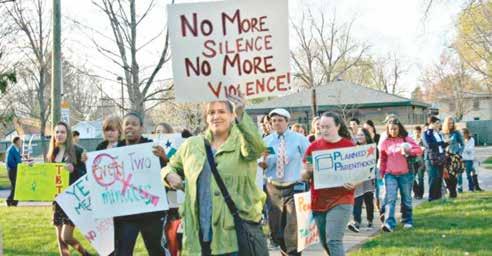

Tompkins Community Action (TCAction) is a nonprofit organization classified as a Community Action Agency first started as a grassroots effort in 1964 and later founded in 1966. At its core, it aims to address poverty and empower low-income residents in the Tompkins County area. It operates 21 programs serving over 5,000 individuals annually, providing housing, family and community services with a focus on self-sufficiency. Its first program was a county-wide head start program which is still maintained today. Since then, it has expanded childcare centers head start programs to Dryden and downtown Ithaca.
Beyond services for victims of domestic or sexual violence, the Advocacy Center also serves victims’ support circle, including friends and family members.
With its team of trained staff and volunteers, the center is able to offer support in attending Sexual Assault Forensic Exams (SAFE) at Cayuga Medical Center, help with developing personal physical and emotional safety plans and assistance filing for state financial reimbursement for a victim’s expenses. The center also offers various support groups and empowerment classes, along with support during court appearances and meetings with police or Title IX investigators.
In July, Executive Director Jennifer Brownell announced that the center would see $140,000 less in state funding due to new contracts with the NYS Office of Children and Family Services and the NYS Office of Victim Services.
“This is a blow that is felt across the State with the majority of victim service agencies reporting a cut in funding,” Brownell said. “I continue to be grateful to NYS, who has notoriously invested in victim services. I know they are faced with difficult decisions on ensuring that funds are used most effectively and where the need is greatest.”
The Advocacy Center is largely grantfunded, but is always accepting individual donations to support youth and adult survivors of domestic and sexual violence. It also accepts monthly contributions through its ChangeMaker program, along with donations of goods and services through an Amazon wish list.
To make a donation, visit https://www. actompkins.org/supportus/
TCAction operates four supportive housing sites in Ithaca—Chartwell House, Magnolia House, Amici House, and the Corn Street Apartments—providing safe housing for residents experiencing homelessness. TCAction staff work directly with residents to provide support and resources to help maintain long-term housing. In 2014, TC Action opened the Magnolia House, which was the first supportive housing program

local women. At the Amici House and Corn Street, it provides supportive housing to young adults 18 to 25 years old. It has partnered with the Vecino Group to transition dozens of individuals experiencing homelessness to housing at Asteri Ithaca and Ithaca Arthaus.
TC Action also administers the local Housing Choice Voucher Program (formerly Section 8), helping income-eligible families secure stable housing in Tompkins County. The state program assists residents across the state with securing long-term housing by covering a portion of rent. In Tompkins County, over 2,000 vouchers are administered.
To volunteer or donate to TC Action, visit https://tcaction.org/ about-us/support-us/ CINEMAPOLIS

On any given day, downtown visitors have the opportunity to see a variety of independent, foreign and locally-produced films at Cinemapolis, Ithaca’s very own independent theater. Cinemapolis has been a downtown staple since it moved to its Green Street location in 2009, but its roots in Ithaca span back nearly 40 years.
In 2000, Cinemapolis went nonprofit with the foundation of The Seventh Art Corporation of
Ithaca. For Ithacans, it offers affordable, accessible screenings that support local filmmakers and broaden cultural perspectives.
In recent years, the theater has been recovering from a year-long closure during the COVID-19 pandemic and has grappled with rising rents and lengthy construction during the Green Street Redevelopment project.
Last year, facing a significant rent increase, the theater negotiated with its landlord and secured “long-term control” of its space in a nearly $1 million sale. Earlier this year, the theater reached an agreement with the Tompkins County Industrial Development Agency to exempt it from paying local property taxes for the 28year duration of its bond financing. Until then, leadership said it had been the only arts organization in Tompkins County paying property taxes due to its complex ownership structure. This has lowered its overhead costs, but the theater's operational expenses are still less than 75% funded by ticket and concession sales.
Now, beyond accepting general donations to support community cinema, the theater is accepting donations towards its capital campaign—aiming to pay down its mortgage. Cinemapolis also operates various annual membership programs where “Cinemapolitans” can support the theatre and get discounts on tickets and concessions.
To donate to Cinemapolis, visit https://www.cinemapolis.org/donate



The Ithaca Health Alliance is a local nonprofit that sponsors and operates the Ithaca Free Clinic, one of the first free clinics in the country to provide both primary medical care and holistic services in an integrated model. When it first opened, there were only 3 free medical integrated clinics in the entire country.
The clinic offers need-based access to health care by offering services to individuals without health insurance or individuals whose insurance does not cover the services they need. The belief of health care as a human right is central to its mission.
The clinic's small staff and group of dedicated volunteers serve over 600 patients annually. Services are offered free to patients because the Ithaca Health Alliance’s clinicians offer their services on a volunteer basis.
The clinic is always accepting volunteer providers (MDs, NPs, PAs, RNs, LMSWs, Massage Therapists, etc.) to increase the availability and scope of free services, in addition to offering student and non-provider opportunities via an application process on its website.
Donations made to the Ithaca Free Clinic ensure health care access for vulnerable Ithacans that otherwise would be unable to afford services. Donations of various amounts can support services as simple as a herbal tincture or blood work to annual pap-smears
are unfolding at a time when natural history preservation is declining globally. The museum nearly closed in January, but budget, program and staff cuts, alongside community crowdfunding and two separate $1 million anonymous donations, have kept PRI afloat for now.
or pre-employment physicals. To make a donation, visit https:// www.ithacahealth.org/donate

The Paleontological Research Institution (PRI) which operates Ithaca’s Museum of the Earth, is a local nonprofit that has been facing financial hardships for the past three years after a donor failed to deliver on a multi-million dollar annual pledge. As covered in the Oct. 22 issue of the Ithaca Times, the institution’s financial crisis has reached a tipping point and must raise $1 million before the end of the year to avoid a foreclosure.
The museum is one of the last natural history museums in upstate New York, and its hardships
The museum has rare and world-renowned collections, including its iconic Hyde Park mastodon and Burgess Shale and Cambrian period fossil collection. It has one of the largest collections of fossil invertebrates in the world, with seven to 10 million samples. PRI staff have catalogued items within the collection and are negotiating with other museums and educational institutions to arrange for their preservation if the museum closes.
In an interview with the Ithaca Times last month, PRI Director Warren Allmon and Board of Trustees member Dan Karig said that while the museum’s debt can seem insurmountable, individuals can make a difference through small contributions.
“[The museum is] a resource that the whole community can, should and does use,” Karig said in an interview with the Times.
PRI and the Museum of the Earth are a stronghold in Ithaca’s scientific research community. Their preservation ensures the protection of decades of scientific work, education and public access to natural history.
To make a donation to PRI, visit https://www.priweb.org/mortgage-campaign-landing-page

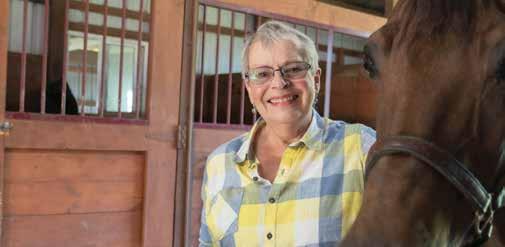
Cancer Care that connects to world-class expertise.
Cayuga Cancer Center offers advanced, compassionate cancer care tailored to each patient. Services include cuttingedge chemotherapy, immunotherapy, hormone therapy, precise IMRT radiation for multiple cancer types, and accredited 3D mammography for early breast cancer detection—all delivered by an experienced, dedicated team of oncology specialists.

Cayuga Cancer Center clinicians collaborate with Weill Cornell Medicine physicians to develop treatment plans for complex oncology cases, in clinical research trials, and through physician telemedicine consults.





By Peter Rothbart
The Cayuga Chamber Orchestra returns to more traditional ground, presenting three wellknown powerhouses of the 19th century Romantic era orchestral repertoire. The November 22nd concert in Ithaca College’s Ford Hall is themed “Ebb and Flow” and reflects Music Director Guillaume Girard’s interpretation of Felix Mendelssohn’s evocative Hebrides Overture, his graceful and celebrated Violin Concerto in E minor, and Johannes Brahms’s monumental and brooding Symphony No. 4 in E minor. It’s hard to miss the ebb and flow in Mendelssohn’s Hebrides Overture, also known as Fingal’s Cave. The mid-1800s work was inspired by the Atlantic Ocean’s waves crashing onto the rocks of Staffa one of Scotland’s remote Hebrides Islands. Fingal’s Cave is a sea cave carved into the rocks by the ocean. Mendelssohn was so inspired during a visit to the cave that he immediately jotted down the opening figures to the work. In a recent interview on WSKG radio, Maestro Pirard explained, “It’s quite programmatic in the way it sounds…describing the feeling that we have when we are on the ocean and maybe around that kind of quite rugged terrain.”
The overture is often considered to be the first tone poem; a Romantic-era one-movement form that reflects a composer’s emotional response to a specific place, person, or event. It is a restless work, beginning with continuously flowing sixteenth notes in the lower strings roiling the musical landscape with waves of reoccurring crescendos and decrescendos.
The concert’s ebb and flow undercurrent may not be immediately apparent in Mendelssohn’s Violin Concerto in E minor, but it is there in the arpeggiated restlessness–think chord tones played sequentially rather than simultaneously–of the opening which serves as the harmonic and rhythmic foundation for the three-movement work.
Mendelssohn’s epic work is one of the most performed and popular concertos in the clas-
Cayuga Chamber Orchestra
Saturday, November 22, 2025 Ford Hall, Ithaca College, Ithaca, NY
7:30 PM, Pre-concert chat at 6:30 PM Tickets available at https://www.ccoithaca.org
(Note that in addition to regular ticket prices, this concert is a Pay-What-You-Can-Performance sponsored by Wegman’s and Guthrie. Go to https://www.ccoithaca.org/pay-whatyou-can for further information.)
sical world, endearing to audiences as well as violinists. It inhabits the pantheon of concertos, along with works by Paganini, Dvořák, Beethoven, Brahms, Tchaikovsky, and Bruch.
The work is historically important because it reflects the transition from Classicism to Romanticism. Listen for 18th century markers such as singable melodies, balanced phrasing, and the use of traditional forms. Here we can also find the beginnings of 19th century Romanticism as the three movements are performed without a break. Mendelssohn also shakes up the established concerto form by having the violin soloist rather than the orchestra announce the melody at the very beginning. Mendelssohn also composed the cadenza, breaking with the tradition of the soloist improvising or composing his or her own cadenza.
Violinist and MacArthur Fellow Johnny Gandelsman tackles the concerto as a Grammy winning violinist and producer, and advocate for contemporary music collaborations. Active in the World music scene as a nearly two-decade member of the Silk Road Ensemble, he is also the creative force behind “This is America: An Anthology,” a series of commissioned works from composers from a variety of religious, ethnic, and cultural backgrounds (and a wealth of musical ones) that celebrates the strength and diversity of contemporary American composers.
At the same time, he maintains a strong commitment to the classical genre having premiered over 80 new works. Music columnists often use the adjective “radical” to describe his playing.
Where does one go when writing about Johannes Brahms’s Symphony No. 4? Brahms was as complex as his music, one of the last great symphonists of the 19th century. Do I write about the subtle complexity and maturity of his counterpoint that permeates the entire work? His counterpoint is as multi-dimensional as Johann Sebastian Bach’s, whom he admired. Do I talk about his masterful use of the extended harmonies, his use of dissonance, and his painterly control of the orchestral colors available to late 19th century composers? Or do I remark on his loyalty to Classicism’s forms and conventions?
Perhaps I should focus on the composer’s demeanor, which ebbed and flowed between social aloofness and jagged emotional outbursts, reflecting both a subtle joyousness and melancholic darkness in his writing?
They are all intertwined in his gravitas-laden Symphony No. 4 in E minor, the only one of his four symphonies that starts and ends in a minor key. Melodies organically emerge from one to another throughout the work, which ebbs and flows between major and minor keys.

The Cayuga Chamber Orchestra, led by Music Director Guillaume Girard, brings the Romantic era to life with Mendelssohn and Brahms at Ford Hall on Nov. 22.
(Photo: John D. and Catherine T. MacArthur)
The first movement’s opening theme is a series of descending thirds that ebb and flow at a medium tempo leaving one with a sense of wearied breathing, as if the music was tired but alive. This seesaw-like breathing, this hint of melancholy, is mid-life Brahms personified. It is countered by interjections of heraldic brass fanfares that rise above the underlying restiveness, outbursts of resoluteness and optimism.
The second movement references the Phrygian mode, a nod to medieval and Renaissance musical times. The heroic brassy outbursts yield to the momentary optimism of the third movement, Brahms at his happiest.
The fourth movement, however, can be interpreted as being either tragically ominous or philosophically stoic, a reflection of Brahms’s growing awareness of his mortality and his fear for the future of his music and the world. The movement is a meticulously choreographed chaconne–an 8-measure repeating bass line with harmonic and melodic variations laid above it–and is adapted from Bach’s cantata No.150, the text of which affirms that, “All my days which pass in suffering, God ends at last in joy.”
Peter Rothbart is a Professor Emeritus of Music at the Ithaca College School of Music, Theatre and Dance where he taught electroacoustic and media music for 40 years. He remains active as a classical, jazz, and pop musician.
By Clement Obropta
Tatiana Maslany needs to get the hell out of that house. Specifically, I mean the cabin in the woods in “Keeper,” where her character, an artist named Liz, has gone for a weekend retreat with her doctor boyfriend, Malcolm (Rossif Sutherland).
Malcolm’s isolated family home is actually quite nice — it’s sleek and modernist, with ornate dark wood paneling and an elegant kitchen. Only, there are many wide windows with no curtains, and only the bathroom door has a lock on it. At night, Liz hears odd footsteps, and she can make out some murmurs coming from the vents. Malcolm’s ne’er-do-well cousin (Birkett Turton) also has a habit of showing up unannounced with his Eastern European girlfriend (Eden Weiss) in tow. Strangest of all is the mysterious chocolate cake the housekeeper left in the kitchen, and Malcolm insists that Liz try a piece. Naturally, Malcolm seems oblivious to the eeriness of it all.
Writer-director Osgood Perkins cooks up a delightful little amuse-bouche with this premise, and for about an hour, that’s all “Keeper” is. A woman trapped in a cabin knows that something is definitely, unequivocally wrong, and when her boyfriend suddenly leaves on an urgent work call, Liz’s suspicions are slowly, terrifyingly, proven correct. And then the other shoe drops.
The final 30 minutes of “Keeper” feel like Liz has finally found the light switch after stumbling around in the dark. The revelation of what’s really going on is too delicious to spoil, and it more than makes up for the somewhat slow and inscrutable first hour of the film. The last reel is a hell-for-leather sprint into clever paranormal scares and satisfying twists before reaching a decisively feminist conclusion and an all-time-great needle drop over the end credits. Within the span of

a single monologue from Sutherland’s character, “Keeper” morphs before your eyes into a far more complex, imaginative, and engaging feature. It reminds you that, hey, this Osgood Perkins guy is pretty good at this horror stuff.
Perkins, the son of actors Anthony Perkins and Berry Berenson, has been making horror films for over a decade now. He’s breached the mainstream with his latest three pictures: “Longlegs,” “The Monkey,” and now “Keeper.” He’s in that rare club now of filmmakers whose work is largely promoted on the strength of his name alone — and the fewer trailers you see for “Keeper,” the better. “Keeper” has neither the laughs of “The Monkey” nor the procedural structure of “Longlegs.” This is much more surreal, a nightmare play of gender roles and supernatural reckonings.
the maw of danger, something about Maslany’s cool control and perceptive gaze puts you at ease. She also delivers the most memorable chocolate cake-devouring scene since “Matilda.” Maslany previously co-starred in Perkins’ black comedy “The Monkey” as a loving and realistically cynical mom, and she’s one of the highlights of that movie, an anchor of compassion and joy amid a black sea of death and brutality. She’s also an executive producer on “Keeper.”
Sutherland — yes, related to that Sutherland — is also pitch-perfect in his role as the boyfriend with a potential skeleton in his closet. His gentle, low tone and bearlike physique make him seem like a slumbering giant, like someone you wouldn’t want to get on the wrong side of.
The scares, too, are a sore spot for “Keeper.” The film overly relies on quick cuts to loud, screaming women for easy jumpscares, the kind of disappointing gimmickry Perkins largely avoided in “Longlegs” and “The Monkey.”
Despite those shortcomings, “Keeper” is a smart horror picture told confidently by an expert of the genre. It explores power dynamics in relationships and interrogates the immense power that men — especially wealthy men — have over their female partners.
Rated R Directed
Tatiana Maslany absolutely carries “Keeper.” The actress, perhaps best known for her Emmy-winning role in “Orphan Black,” plays the doomed girlfriend with resolve and intelligence. You’re always on Liz’s side, and even when she’s clearly headed right into
It’s not a perfect film, though — of his three recent films, “Keeper” has Perkins’ weakest screenplay. A few elements, like Liz’s best friend and the suspicious cousin, are never really paid off, and some aspects of the plot still don’t make sense once the credits roll.
Still, the surplus of mixed reviews would suggest that “Keeper” is a hard film to love. Its small scale and stripped-back story have perhaps condemned it to footnote status in Perkins’ filmography. But Maslany’s terrific performance and the goosebump-inducing final act are more than worthwhile for any horror fans willing to brave the November cold for yet another cabin-inthe-woods story.
Curated by Roy Allen: Director of Strategic Partnerships — Ithaca Times, Finger Lakes Community Newspapers, www.ithaca.com
Many more voices have contributed to this nation we call America. The voice we spotlight this week is that of Frederick Douglass from his famous “What to the Slave is the Fourth of July?” speech delivered on July 5, 1852 at Corinthian Hall in Rochester, New York..
In a time of great national division, listening to voices of the past might help us prepare for more unity in the future. These speeches were not delivered in silence — they were shouted across divides, whispered in courage, and sung in hope. They remind us that freedom is not a solo act — it is a chorus
What to a Slave is the Fourth of July?
— 1852 — Frederick Douglass
“Fellow Citizens, I am not wanting in respect for the fathers of this republic. The signers of the Declaration of Independence were brave men. They were great men, too great enough to give frame to a great age. It does not often happen to a nation to raise, at one time, such a number of truly great men. The point from which I am compelled to view them is not, certainly, the most favorable; and yet I cannot contemplate their great deeds with less than admiration. They were statesmen, patriots and heroes, and for the good they did, and the principles they contended for, I will unite with you to honor their memory...
...Fellow-citizens, pardon me, allow me to ask, why am I called upon to speak here to-day? What have I, or those I represent, to do with your national independence? Are the great principles of political freedom and of natural justice, embodied in that Declaration of Independence, extended to us? and am I, therefore, called upon to bring our humble offering to the national altar, and to confess the benefits and express devout gratitude for the blessings resulting from your independence to us?
Would to God, both for your sakes and ours, that an affirmative answer could be truthfully returned to these questions! Then would my task be light, and my burden easy and delightful. For who is there so cold, that a nation’s sympathy could not warm him? Who so obdurate
and dead to the claims of gratitude, that would not thankfully acknowledge such priceless benefits? Who so stolid and selfish, that would not give his voice to swell the hallelujahs of a nation's jubilee, when the chains of servitude had been torn from his limbs? I am not that man. In a case like that, the dumb might eloquently speak, and the “lame man leap as an hart.”
But such is not the state of the case. I say it with a sad sense of the disparity between us. I am not included within the pale of glorious anniversary! Your high independence only reveals the immeasurable distance between us. The blessings in which you, this day, rejoice, are not enjoyed in common. The rich inheritance of justice, liberty, prosperity and independence, bequeathed by your fathers, is shared by you, not by me. The sunlight that brought light and healing to you, has brought stripes and death to me. This Fourth July is yours, not mine. You may rejoice, I must mourn. To drag a man in fetters into the grand illuminated temple of liberty, and call upon him to join you in joyous anthems, were inhuman mockery and sacrilegious irony. Do you mean, citizens, to mock me, by asking me to speak to-day? If so, there is a parallel to your conduct. And let me warn you that it is dangerous to copy the example of a nation whose crimes, towering up to heaven, were thrown down by the breath of the Almighty, burying that nation in irrevocable ruin! I can to-day take up the plaintive lament of a peeled and woesmitten people!
“By the rivers of Babylon, there we sat down. Yea! We wept when we remembered Zion. We hanged our harps upon the willows in the midst thereof. For there, they that carried us away captive, required of us a song; and they who wasted us required of us mirth, saying, Sing us one of the songs of Zion. How can we sing the Lord’s song in a strange land? If I forget thee, O Jerusalem, let my right hand forget her cunning. If I do not remember thee, let my tongue cleave to the roof of my mouth.”
Fellow-citizens, above your national, tumultuous joy, I hear the mournful wail of millions! whose chains, heavy and grievous yesterday, are, to-day, rendered
more intolerable by the jubilee shouts that reach them. If I do forget, if I do not faithfully remember those bleeding children of sorrow this day, “may my right hand forget her cunning, and may my tongue cleave to the roof of my mouth!” To forget them, to pass lightly over their wrongs, and to chime in with the popular theme, would be treason most scandalous and shocking, and would make me a reproach before God and the world. My subject, then, fellow-citizens, is American slavery. I shall see this day and its popular characteristics from the slave’s point of view. Standing there identified with the American bondman, making his wrongs mine, I do not hesitate to declare, with all my soul, that the character and conduct of this nation never looked blacker to me than on this 4th of July! Whether we turn to the declarations of the past, or to the professions of the present, the conduct of the nation seems equally hideous and revolting. America. is false to the past, false to the present, and solemnly binds herself to be false to the future. Standing with God and the crushed and bleeding slave on this occasion, I will, in the name of humanity which is outraged, in the name of liberty which is fettered, in the name of the constitution and the Bible which are disregarded and trampled upon, dare to call in question and to denounce, with all the emphasis I can command, everything that serves to perpetuate slavery the great sin and shame of America! “I will not equivocate; I will not excuse”; I will use the severest language I can command; and yet not one word shall escape me that any man, whose judgment is not blinded by prejudice, or who is not at heart a slaveholder, shall not confess to be right and just.
But I fancy I hear some one of my audience say, “It is just in this circumstance that you and your brother abolitionists fail to make a favorable impression on the public mind. Would you argue more, and denounce less; would you persuade more, and rebuke less; your cause would be much more likely to succeed.” But, I submit, where all is plain there is nothing to

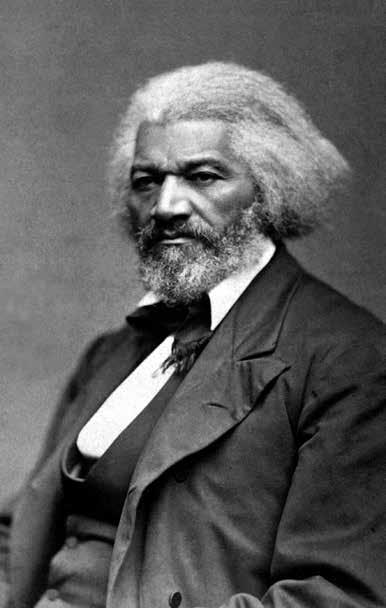
be argued. What point in the anti-slavery creed would you have me argue? On what branch of the subject do the people of this country need light? Must I undertake to prove that the slave is a man? That point is conceded already. Nobody doubts it. The slaveholders themselves acknowledge it in the enactment of laws for their government. They acknowledge it when they punish disobedience on the part of the slave. There are seventy-two crimes in the State of Virginia which, if committed by a black man (no matter how ignorant he be), subject him to the punishment of death; while only two of the same crimes will subject a white man to the like punishment. What is this but the acknowledgment that the slave is a moral, intellectual, and responsible being? The manhood of the slave is conceded. It is admitted in the fact that Southern statute books are covered with enactments forbidding, under severe fines and penalties, the teaching of the slave to read or
continued from page 19
to write. When you can point to any such laws in reference to the beasts of the field, then I may consent to argue the manhood of the slave. When the dogs in your streets, when the fowls of the air, when the cattle on your hills, when the fish of the sea, and the reptiles that crawl, shall be unable to distinguish the slave from a brute, then will I argue with you that the slave is a man!
For the present, it is enough to affirm the equal manhood of the Negro race. Is it not astonishing that, while we are ploughing, planting, and reaping, using all kinds of mechanical tools, erecting houses, constructing bridges, building ships, working in metals of brass, iron, copper, silver and gold; that, while we are reading, writing and ciphering, acting as clerks, merchants and secretaries, having among us lawyers, doctors, ministers, poets, authors, editors, orators and teachers; that, while we are engaged in all manner of enterprises common to other men, digging gold in California, capturing the whale in the Pacific, feeding sheep and cattle on the hill-side, living, moving, acting, thinking, planning, living in families as husbands, wives and children, and, above all, confessing and worshipping the Christian's God, and looking hopefully for life and immortality beyond the grave, we are called upon to prove that we are men!
Would you have me argue that man is entitled to liberty? that he is the rightful owner of his own body? You have already declared it. Must I argue the wrongfulness of slavery? Is that a question for Republicans? Is it to be settled by the rules of logic and argumentation, as a matter beset with great difficulty, involving a doubtful application of the principle of justice, hard to be understood? How should I look to-day, in the presence
continued from page 9
make myself a promise: I will not be the old man shaking his fist at the wind. I will be the one who opens his hand and lets the bright years go, trusting that they will drift exactly where they are needed— down to the small, fierce hearts already reaching up.
And, at this 54 year old weekly newspaper, I smile each week when the young ones step up and when the older ones help pass the paper into the hands of brave young journalists — most of them
of Americans, dividing, and subdividing a discourse, to show that men have a natural right to freedom? speaking of it relatively and positively, negatively and affirmatively. To do so, would be to make myself ridiculous, and to offer an insult to your understanding. There is not a man beneath the canopy of heaven that does not know that slavery is wrong for him. What, am I to argue that it is wrong to make men brutes, to rob them of their liberty, to work them without wages, to keep them ignorant of their relations to their fellow men, to beat them with sticks, to flay their flesh with the lash, to load their limbs with irons, to hunt them with dogs, to sell them at auction, to sunder their families, to knock out their teeth, to burn their flesh, to starve them into obedience and submission to their mastcrs? Must I argue that a system thus marked with blood, and stained with pollution, is wrong? No! I will not. I have better employment for my time and strength than such arguments would imply. What, then, remains to be argued? Is it that slavery is not divine; that God did not establish it; that our doctors of divinity are mistaken? There is blasphemy in the thought. That which is inhuman, cannot be divine! Who can reason on such a proposition? They that can, may; I cannot. The time for such argument is passed. At a time like this, scorching irony, not convincing argument, is needed. O! had I the ability, and could reach the nation's ear, I would, to-day, pour out a fiery stream of biting ridicule, blasting reproach, withering sarcasm, and stern rebuke. For it is not light that is needed, but fire; it is not the gentle shower, but thunder. We need the storm, the whirlwind, and the earthquake. The feeling of the nation must be quickened; the conscience of the nation must be roused; the propriety of the nation must be startled; the hypocrisy of the nation must be
younger than my own children. As for the stick-in-muds who just don’t want to let go of the power — time will take care of that too. Embracing the cycle of life is best when greeted voluntarily — but eventually, it happens to the best of us.
This cycle is not cruel. It is exacting. It asks the departing season to bless the one arriving. And if we meet that demand with open hands instead of clenched fists, we discover something astonishing: we do not end smaller than we began.
We end larger—because everything we truly loved keeps growing long after we are gone.
exposed; and its crimes against God and man must be proclaimed and denounced. What, to the American slave, is your 4th of July? I answer; a day that reveals to him, more than all other days in the year, the gross injustice and cruelty to which he is the constant victim. To him, your celebration is a sham; your boasted liberty, an unholy license; your national greatness, swelling vanity; your sounds of rejoicing are empty and heartless; your denunciation of tyrants, brass fronted impudence; your shouts of liberty and equality, hollow mockery; your prayers and hymns, your sermons and thanksgivings, with all your religious parade and solemnity, are, to Him, mere bombast, fraud, deception, impiety, and hypocrisy — a thin veil to cover up crimes which would disgrace a nation of savages.There is not a nation on the earth guilty of practices more shocking and bloody than are the people of the United States, at this very hour.
Go where you may, search where you will, roam through all the monarchies and despotisms of the Old World, travel through South America, search out every abuse, and when you have found the last, lay your facts by the side of the everyday practices of this nation, and you will say with me, that, for revolting barbarity and shameless hypocrisy, America reigns without a rival...
...Allow me to say, in conclusion, notwithstanding the dark picture I have this day presented, of the state of the nation, I do not despair of this country. There are forces in operation which must inevitably work the downfall of slavery. “The arm of the Lord is not shortened,” and the doom of slavery is certain. I, therefore, leave off where I began, with hope. While drawing encouragement from “the Declaration of Independence,” the great principles it contains, and the genius of American Institutions, my spirit is also cheered by the obvious tendencies of the
continued from page 12
who led the Red Dragons to the Division III national championship 2 years ago, Rescigno had stepped up, winning eight in a row after losing the season opener. He was good by any measure, but when the Bombers put together two beautiful third quarter drives — in the rain — of 15 and 14 plays, and took 9 minutes off the clock each time, any opposing QB could only watch.
I loved the story line of a Section IV athlete playing a huge role. Nicholas Lang
age. Nations do not now stand in the same relation to each other that they did ages ago. No nation can now shut itself up from the surrounding world and trot round in the same old path of its fathers without interference. The time was when such could be done. Long established customs of hurtful character could formerly fence themselves in, and do their evil work with social impunity. Knowledge was then confined and enjoyed by the privileged few, and the multitude walked on in mental darkness. But a change has now come over the affairs of mankind. Walled cities and empires have become unfashionable. The arm of commerce has borne away the gates of the strong city. Intelligence is penetrating the darkest corners of the globe. It makes its pathway over and under the sea, as well as on the earth. Wind, steam, and lightning are its chartered agents. Oceans no longer divide, but link nations together. From Boston to London is now a holiday excursion. Space is comparatively annihilated. — Thoughts expressed on one side of the Atlantic are distinctly heard on the other. The far off and almost fabulous Pacific rolls in grandeur at our feet. The Celestial Empire, the mystery of ages, is being solved. The fiat of the Almighty, “Let there be Light,” has not yet spent its force. No abuse, no outrage whether in taste, sport or avarice, can now hide itself from the all-pervading light. The iron shoe, and crippled foot of China must be seen in contrast with nature. Africa must rise and put on her yet unwoven garment. ‘Ethiopia, shall, stretch. out her hand unto Ood.” In the fervent aspirations of William Lloyd Garrison, I say, and let every heart join in saying it: God speed the year of the Jubilee.”
Next week, we will publish Susan B� Anthony’s 1873 speech “A Woman’s Right to Vote”.
— a junior wide receiver from Union-Endicott — linked up with QB Michael Reed and caught 6 passes for 88 yards and two huge touchdowns, and made the big plays when needed.
There was some drama in the fourth quarter, as Ithaca intercepted a pass in the end zone with 1:11 left. That should have sealed it, but a weak three-and-out gave the visitors another chance. The crowd went wild when a last second pass sailed out of the end zone to seal the Bombers’ 26-21 win.
Unfortunately, the Bombers were denied an at-large playoff bid, but the Jug is back on South Hill.
By Jake Sexton
Following a historic 43 day-long government shutdown coming to a close this week, federal benefits, aid programs and government employees have begun returning to operations at limited capacity. In the midst of the shutdowns’ end, many Americans — particularly those who receive government subsidies — are left feeling incredibly vulnerable, with expiration dates being applied to many programs they rely on.
The debate surrounding governmentfunded welfare programs is not one of mere recent memory; rather, it’s sat at the forefront of political discourse for decades. Fifty years ago, this week, an article by Deboroah Schoch, titled “No Answers for Ithaca’s Welfare Plight,” was published on Nov. 16, 1975, in Issue no. 134 of the Ithaca Times. Schoch’s 1975 article was littered with anxiety: from climbing caseloads falling to the wayside, growing distrust with the state and its guidelines to a collective belief that the local government was being drained by shrinking resources and federal mandates. The article captured a special moment in Tompkins County and the broader national zeitgeist, as more Americans took the stance that the current welfare system was punishing, not relieving.
Schoch’s piece highlighted the widespread concern sweeping local officials. Federal Health, Education, and Welfare (HEW)s auditors were threatening bureaucrats at both the local and state level with penalties for overpayments and ineligible cases. In the face of these sanctions, local legislators were forced to propose tough reforms on work requirements and definitions of eligibility.
The pre-existing system was described as a “bureaucratic nightmare” by county board representatives and caseworkers, what can only be described as an early articulation of the administrative burdens which would later define concerns surrounding the national welfare policy. One caseworker who spoke with Schoch expressed grievances regarding the system’s generation of fear for both social workers
and welfare recipients, questioning if the system even inspired people to work as opposed to inspiring complacency.
The overarching sentiment of caseworkers and recipients alike was one of concern: the current system cannot support the Americans who require it.
“I don’t think there’s a way of cutting down on welfare payments […] unless, in fact, this country is going to say to people, ‘We have no obligation to see to it that people don’t starve.’” Nancy Bereano, associate and advisor to the county Welfare Rights Organization, stated in Schoch’s article.
Over the next 25 years, both local and national policy moved sharply towards restriction and strenuous requirement thresholds. For instance, the Omnibus Budget Reconciliation Act of 1981 slashed federal funding for food stamps, housing and other welfare programs across the country, leaving both states and counties with rising demands and dwindling resources.
Additionally, New York state repeatedly cut its own contributions to welfare programs throughout the 80s and 90s. Despite budget constraints, caseloads continued to pile up. It wasn’t until the Personal Responsibility and Work Opportunity Reconciliation Act of 1996 (PRWORA), which transformed the current welfare system into TANF. Under the TANF structure, new impositions such as time limits, mandatory work requirements, revised sanctions and a block-grant system which had not increased with inflation previously. The philosophical ideas which inspired PRWORA — sanctions, work mandates, and a stricter definition of “need” — were all sentiments shared in Schoch’s 1975 article, slowly being realized 20 years later.
By the turn of the millennia, Ithaca became one of the least affordable small cities in the entire country, with the cost of living rapidly outpacing wage growth. Childcare shortages compounded this problem. Per the Child Development Council, Tompkins County is considered a “childcare desert,” with more than three children per every available slot. To top
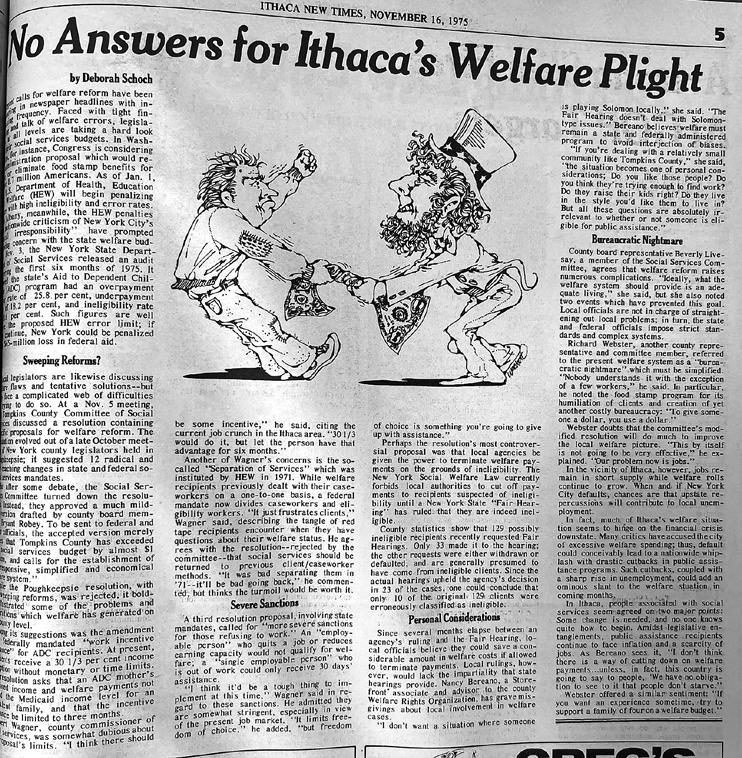
it off, staffing challenges have yet to be resolved in the Department of Social Services, mirroring the concerns from 1975. Turnover rose, workloads piled up, and caseworkers once again were encumbered with rigid federal rules and lackluster local resources.
The “bureaucratic nightmare” of the 1970s has come back to rear its ugly head.
In the last five years, the COVID-19 pandemic hit welfare-reliant families the hardest. Food insecurity surged, and mutual aid food sharing (MA) was a nationally tested and implemented plan that mobilized the community to help meet insecurity needs. The National Institute of Health’s study of MA in Tompkins County found that 40% of sampled households faced immediate food security during the pandemic, and while MA improved food access, barriers remained.
In response to the pandemic, temporary federal expansions such as emergency SNAP, enhanced child tax credits and rent relief briefly reduced poverty, but only as a quick fix. When these exemptions and extensions expired, poverty spiked again,
illustrating how strongly federal policy could shape local outcomes.
Today, Tompkins County DSS continues navigating staffing shortages, housing instability, insecurities and the exemption of emergency assistance needs. Today, over 80% of emergency cases involve evictions, utility shutoffs, or a general lack of stable housing — a dramatic change from that of 1975’s welfare landscape painted by Schoch.
When we turn the clock back 50 years in the Ithaca Times, we can see the prevailing anxieties of the time were not temporary. Rather, they were the beginning of a national movement towards the restructuring of the welfare system. Yet, one thread remains unbroken: local agencies are still tasked with meeting community needs while understaffed, underfunded and without proper guidelines shaped by our government. Fifty years ago and today, poverty has been directly shaped and impacted by policy; and, until policy keeps pace with the economic realities of our communities, Schoch’s 1975 refrain — “no answers” — remains unanswered.
11/20 Thursday
Old Time Music with Pete Thompson and Friends | 6 p.m. | South Hill Cider, 550 Sandbank Rd. | Free
11/21 Friday
Off the Rails | 6 p.m. | Hopshire Farm & Brewery, 1771 Dryden Rd.
11/22 Saturday
Young Legs | 6 p.m. | South Hill Cider, 550 Sandbank Road
Concerts/Recitals
11/19 Wednesday
Student Chamber Recital: Piano and Strings II | 7 p.m. | Hockett Family Recital Hall, Ithaca College
Stucky Ensemble-in-Residence Splinter Reeds Performance (CU Music) | 7:15 p.m. | Hans Bethe House, 314 West Ave. | Free
Student Ensemble: Jazz Repertory Ensemble and Jazz Lab Band | 8:15 p.m. | Ford Hall, Ithaca College
11/20 Thursday
Splinter Reeds Performance (CU Music) | 7:30 p.m. | Barnes Hall, 129 Ho Plaza | Free
Abbie Harrison, bassoon | 8:15 p.m. | Hockett Family Recital Hall, Ithaca College
11/21 Friday
Smartphone Orchestra | 4 p.m. | The Downstairs, 121 E M.L.K. Jr. St.
Almost Queen: A Tribute to Queen | 7 p.m. | State Theatre of Ithaca
Cornell Wind Symphony | 7:30 p.m. | Bailey Hall, Cornell University | Free
Live Dead & Brothers | 8 p.m. | Center for the Arts of Homer, 72 S Main St., Homer NY
11/22 Saturday
Thursday Morning Musicales presents the Chrystallum Quartet | 10:15 a.m. | North Presbyterian Church, 921 College Avenue | Free African Drumming and Dance | 7 p.m. | Ford Hall, Ithaca College| Free Stucky Ensemble-in-Residence
Cornell Percussion Ensemble Concert (CU Music) | 3 p.m. | Lincoln Hall, Cornell University | Free
Cortland Coffeehouse PLUS presents classical guitarist Dave Richman | 7 p.m. | Unitarian Universalist Church of Cortland, 3 Church Street | $5.00 - $20.00
Cayuga Chamber Orchestra Presents Ebb and Flow | 7:30 p.m. | Ford Hall, Ithaca College | $5.00$45.00
The Mostly Motown Chorus’s Fall Concert | 7:00 p.m. | First Baptist Church| $15.00
11/23 Sunday
Jazz Social at the Regent Lounge (CU Music) | 5 p.m. | Regent Lounge

at The Statler Hotel, Cornell University | Free
Dark Star Orchestra | 7 p.m. | State Theatre Ithaca
Cornell Chorale Fall Concert (CU Music) | 7:30 p.m. | Bailey Hall, Cornell University | Free
Andrew and Noah Van Norstrand |
7:30 p.m. | Lansing Area Performance Hall , 1004 Auburn Road, Lansing NY
Gillian Welch & David Rawlings | 7:30 p.m. | State Theatre of Ithaca
Kinky Boots | 7:30 p.m., 11/19 Wednesday and 11/20 Thursday | Clemens Center, 207 Clemens Center Parkway, Elmira NY |
Share In/Share Out: End-ofSemester PMA Dance Showcase | 7:30 p.m., 11/21 Friday | Class of ‘56 Dance Studio Theatre, Schwartz Center for the Performing Arts, Cornell University | An end-of-semester showcase of predominately student-devised dance works. | Free Little Women — The Broadway Musical | 7:30 p.m., 11/21 Friday; 11/22, Saturday at 2:00 p.m. and at 7:30 p.m. | Center for the Arts of Homer | This production takes the iconic story into a new context, presenting a version of March sisters in a World War 2 era America.
Our People, Our Stories: Celebrating LGBTQ+ Chosen Family |
Martha Van Rensselaer Hall 1250 Gallery, Cornell University | An exhibit featuring artwork by LGBTQ+ youth and young adults from New York City and Syracuse, hosted by Cornell Human Ecology, in partnership with the Ali Forney Center, The Q Center, the Einhorn Center, and The Pride Lab at Cornell. Weekdays 9-5. | Free Present Conversations II & III — Group BIPoC exhibit & Artist Talks | 6:30 p.m., 11/19 Wednesday, 11/20 Thursday, and 11/21 Friday | Community Arts Partnership of Tompkins County, Center Ithaca, 171 East State St. | A pop-up exhibition by @orozco_gallery
Novemberists | 12 p.m. – 5 p.m., 11/6-30 | State of the Art Gallery, 120 West State Street | Free Third Thursday Artist Alley Open Studio | 4 p.m., 11/20 Thursday | Artist Alley at South Hill Business Campus, 950 Danby Rd. | Join us for the monthly Artist Alley’s Open Studio Night. | Free
Harmony’s Christmas Craft Fair | 11 a.m., 11/21 Friday | Harford Town Hall, 394 State Route 38 | CRAFTERS WANTED: Call Judy 607-844-4569 or mjalsberge@outlook.com Featuring: Crafters, Drawings with prizes, bake sale, soups & chili, hot dogs | Free Daniel Rothenberg’s “The Alchemist’s Press” | 12 p.m., 11/22 Saturday | The Gallery at South Hill, 950 Danby Rd. South Hill Business Campus | Rochester NY based artist Rothenberg is focused on pushing the boundaries of what printmaking and photography can become when they intersect. | Free
Tintype Show at IV Gallery | Three dates only: Friday, 11/21 4-7 p.m.; Saturday, 11/22 from 11 a.m. – 4 p.m. (Opening Reception); and 11/23 from 1-4 p.m. | IV Gallery at Cortright Electric, 653 Elmira Rd., Ithaca | A site-specific installation of historical Tintype Portraits curated by Nicolai Klimaszewski seeks to breathe life into the characters and community that existed in America during the earliest days of photography. A working tintype studio and demos on Sat & Sun. http://eyevee.org/
The Saltonstall Exhibition | 1 p.m., 11/22 Saturday | The Cherry Gallery, 130 Cherry St. | Our second annual show of works from the artists selected for a residency at the Saltonstall Foundation for the Arts in Ithaca | Free
FilmMovie Night- Freakier Friday | 6:30 p.m., 11/21 Friday | Newfield Public Library, 198 Main Street, Newfield NY | Join us for a screening of Freakier Friday with free popcorn provided! Rated PG | Free The Palestine Laboratory — Part 2 | 11 a.m., 11/22 Saturday | Tompkins County Public Library, 101 East Green Street | Join us for a viewing and discussion of the second episode of The Palestine Laboratory as journalist Antony Lowenstein reveals how Israel’s “technology of occupation” is used to subjugate and surveil political dissidents, as well as refugees and migrants in Greece and along the US-Mexico border. | Free
A Watch on the Rhine | 2 p.m., 11/22 Saturday | Cherry Artspace, 102 Cherry St. | This special benefit event for The Cherry Arts will showcase three 30-minute documentaries about Ithaca’s West End neighborhood by acclaimed local filmmaker Gossa Tsegaye. | A donation of any amount can be made through thecherry.org or at the door.

Cornell Men’s Squash vs Trinity College (Conn.) | 3 p.m., 11/19
Wednesday | Belkin Squash Courts
Cornell Women’s Squash vs Trinity College (Conn.) | 3 p.m., 11/19
Wednesday | Belkin Squash Courts
Cornell Men’s Basketball vs Colgate University | 7 p.m., 11/20 Thursday | Newman Arena
Cornell Men’s Swimming & Diving vs Penn and Princeton | 5 p.m., 11/21 Friday | Teagle Pool
Cornell Women’s Swimming & Diving vs University of Pennsylvania | 6 p.m., 11/21 Friday | Teagle Pool
Cornell Men’s Squash vs Western University | 6:30 p.m., 11/21 Friday | Belkin Squash Courts
Cornell Men’s Ice Hockey vs Union College | 7 p.m., 11/21 Friday | Lynah Rink
Cornell Men’s Swimming & Diving vs Penn and Princeton — Swim Meet | 10 a.m., 11/22 Saturday | Teagle Pool
Cornell Football vs Columbia University | 1 p.m., 11/22 Saturday | Schoellkopf Field
Cornell Women’s Swimming & Diving vs Penn and Princeton — Swim Meet | 2 p.m., 11/22 Saturday | Teagle Pool
Ithaca Men’s Basketball vs Western New England University | 4 p.m., 11/22 Saturday | Ben Light Gym, Ithaca College
Cornell Men’s Ice Hockey vs Rensselaer Polytechnic Institute | 7 p.m., 11/22 Saturday | Lynah Rink
Cornell Men’s Squash vs Tufts University | 12 p.m., 11/23 Sunday | Belkin Squash Courts
Cornell Women’s Squash vs Tufts University | 12 p.m., 11/23 Sunday | Belkin Squash Courts
Cornell Men’s Basketball vs Misericordia University | 12 p.m.,
11/26 Wednesday | Newman Arena at Bartels Hall
Cornell Women’s Basketball vs Siena College | 2:30 p.m., 11/26 Wednesday | Newman Arena at Bartels Hall
Argetsinger Symposium on Motorsports History | 11/20 Thursday | Harbor Hotel, 16 N Franklin St., Watkins Glen
A Watch on the Rhine | 2 p.m., 11/22 Saturday | Cherry Artspace, 102 Cherry St. | This special benefit event for The Cherry Arts will showcase three 30-minute documentaries about Ithaca’s West End neighborhood by acclaimed local filmmaker Gossa Tsegaye. | A donation of any amount can be made through thecherry.org or at the door.
LET’S READ + TALK ABOUT CLIMATE - CLIMATE LIT. DISCUSSION | 4:30 p.m., 11/19 Wednesday | Buffalo Street Books, 215 North Cayuga Street | Join us at Buffalo Street Books for community-led conversations about climate change, as we discuss We Will Be Jaguars: A Memoir of My People and The Hunger and The Hunger The Writers’ Room | 6 p.m., 11/19 Wednesday | Tompkins County Public Library, 101 East Green Street | Work on your writing project in the company of other writers. | Free RESILIENT CITIZENS: THE PEOPLE, PERILS, AND POLITICS OF MODERN PREPAREDNESS | 4 p.m., 11/21 Friday | Buffalo Street Books, 215 North Cayuga Street | Join us at Buffalo Street Books with Dr. Chris Ellis for a discussion and signing of his newest book, RESILIENT CITIZENS | Free Poetry and Protest: A Collaborative Event with Fall of Freedom | 7 p.m., 11/22 Saturday | Soil Factory,
142 Ithaca Beer Dr | Join us for an evening of political protest in poetry, a spoken word event | Free Generative Spiral Workshops | 12 p.m., 11/23 Sunday | Buffalo Street Books, 215 North Cayuga Street | Join Buffalo Street Books for a series of workshops with nicole v. basta. These classes are drop-on (come to one, come to some, come to all) and allow space to explore the strange in community, to craft beautiful images, to get your pen moving in a low stakes way. $10-$20 sliding scale per cl | $10.00 - $20.00
Animal Feeding | 4 p.m., 11/19 Wednesday | Sciencenter, 601 1st St. | Join an Animal Keeper to observe snakes, lizards, frogs, and fish snacking on their preferred prey.
Chinese Bilingual Storytime | 4:30 p.m., 11/19 Wednesday | Tompkins County Public Library, 101 East Green Street | Join us for a special Chinese-English bilingual storytime! Enjoy fun stories, songs, and rhymes in both Mandarin and English. Children of all ages and their caregivers are welcome.
Cayuga Chamber Orchestra Family Concert Series | 4 p.m., 11/20 Thursday | Tompkins County Public Library, 101 East Green Street | Get swept up in the magic created by great stories and live music as the CCO and Tompkins County Public Library (TCPL) join forces for our annual Family Concert & Storytime Series
Baby & Toddler Storytime | 10:30 a.m., 11/21 Friday | Tompkins County Public Library, 101 East Green Street | Caregivers and their children are invited to join Cassie for music, rhymes, movement and books. Storytime will be followed by a playtime from 11-12.
More Fall Fun Yoga! | 4 p.m., 11/21 Friday | Tompkins County Public Library, 101 East Green Street | Children
are welcome to join us as we celebrate autumn in a yoga series that flows with the seasons!
Math Fun with MathHappens! | 10 a.m., 11/22 Saturday | Sciencenter, 601 1st St. | Join us for playful, informal math learning with the MathHappens Foundation! Families and kids can explore hands-on activities that make math fun, creative, and connected to everyday life.
Stronger Together — Nurturing and Attachment | 10 a.m., 11/22
Saturday | CCE-Tompkins Education Center, 615 Willow Avenue | Families are invited to come together for free lunch and family fun.
Families Learning Science
Together | 2 p.m., 11/22 Saturday | Tompkins County Public Library, 101 East Green Street | Children ages 5 and up and their families are invited to a free science program co-hosted by Chemists for Outreach and Graduate Inclusion (CoRGi) at Cornell University.
Science Connections: Naturalist
Outreach | 2 p.m., 11/23 Sunday | Sciencenter, 601 1st St | Join us for a special Science Connections series in partnership with Cornell’s Naturalist Outreach Program featuring insects, reptiles, and birds!
Baby & Toddler Playtime | 10 a.m., 11/24 Monday | Tompkins County Public Library, 101 East Green Street | Baby & Toddler Playtime is an unstructured play and social time for children and caregivers offering a warm, child-friendly space with books and age-appropriate toys.
Science Together: Worms | 10:30 a.m., 11/25 Tuesday | Sciencenter, 601 1st St. | Observe and measure live worms! Science Together activities are designed for ages 0-4.
Early Reader Book Club | 3 p.m., 11/25 Tuesday | Tompkins County Public Library, 101 East Green Street | Children in grades K-2 are welcome to join our Early Reader Book Club.

MOSTLY MOTOWN CHORUS
SATURDAY, NOVEMBER 22 AT 7:00 PM
First Baptist Church Ithaca at Dewitt Park, 309 N. Cayuga St. | Cold weather creeping back in? Need something to build back your enthusiasm and joy? Never fear...we have the remedy! The Mostly Motown Chorus will put warmth into your hearts with our upcoming Fall Concert! This upbeat concert will leave you smiling as you listen to great songs from Martha and the Vandellas, The Four Tops, Smokey Robinson, the Supremes and more! Directed by Jan Nigro. Wheelchair accessible. (Photo: Provided)
Good Grief Circle | 2 p.m., 11/19 Wednesday | The Age Well Center, 165 Main St. |
Seymour Lecture in Sports History — “More and More is Less and Less” | 5 p.m., 11/19 Wednesday | Goldwin Smith Hall — Room 132, 232 East Ave | “More and More is Less and Less”: American sports are bigger, flashier—and more exclusive than ever. This talk asks how we got here, and how we can take the games back. | Free
Tompkins County Public Library
Focus Group Discussion | 5 p.m., 11/19 Wednesday | Greater Ithaca Activities Center, 301 W. Court St. | Tompkins County Public Library invites you to a focus group discussion on the 2026-2030 Strategic Plan and Library Use. As we develop our upcoming 5-year strategic plan, we want to hear feedback on how the library can best serve you and the community! | Free LGBTQ+ Youth Group | 5:45 p.m., 11/19 Wednesday | Tompkins County Public Library, 101 East Green Street | Join us at LGBTQ+ Youth Group to do crafts, play games, and socialize. Whether your lesbian, gay, bi, trans, questioning, or just trying to figure things out — we’re here for you!
Beloved Artistic Community Meet Up — Dance in Joy | 6:30 p.m., 11/19 Wednesday | Ithaca Community School of Music and Arts, 330 East State Street | Dance in Joy — Join movement artist Megan Omohundro in exploring how movement helps us shape our understanding of ourselves, others, and the world, all while having fun. | Free DJ Trivia with Dave Ashton | 6:30 p.m., 11/19 Wednesday | Hopshire Farm and Brewery, 1771 Dryden Road | Join Dave Ashton for a challenging round of “DJ Trivia” at Hopshire Farm and Brewery! | Free Trivia! | 7 p.m., 11/19 Wednesday | Liquid State Brewery, 620 West Green Street | Grow your brain or just show it
off to a loveable bunch of Trivia-lovers. Hosted by Ithaca’s Trivia legend, Bob Proehl. Get there early as seats fill up fast! | Free
Wednesday Open Mic Night | 7 p.m., 11/19 Wednesday | The Nocturnal Café, 103 S Geneva St. | Free weekly Wednesday Open Mic night at The Nocturnal Café, Ithaca’s nightlife alternative, featuring music, poetry, dance and more! | Free
Latin Wednesday | 9 p.m., 11/19
Wednesday | The Upstairs, 106 S. Cayuga St. | Meet new dancers, learn new moves, and have fun!
Third Thursday Trivia | 7 p.m., 11/20
Thursday | Join us for an evening of fun and friendly competition! Test your knowledge in pop culture, history, literature, nature, music, movies, and beyond!
Ithaca Urban Renewal Agency (IURA) Board Meeting (resch.) | 9 a.m., 11/20 Thursday | Common Council Chambers, 3rd Floor City Hall 108 E Green St |
The Constitution: Rights to Know | 6 p.m., 11/20 Thursday | Tompkins County Public Library, 101 East Green Street | This program will discuss how the notion of Citizenship has changed over time, how to apply for citizenship, and recent efforts to repeal birthright citizenship.
Harmony’s Christmas Craft Fair | 11 a.m., 11/21 Friday | Harford Town Hall, 394 State Route 38 | Harmony’s Christmas CRAFT FAIR on November 21 from 11-6 p.m. and November 22 from 9-4 p.m. CRAFTERS WANTED: Call Judy 607-844-4569 or mjalsberge@ outlook.com . Featuring: Crafters, Drawings with prizes, bake sale, soups & chili, hot dogs | Free 420 at 402: A space for cannabis enthusiasts, & 420-friendly connections! | 3 p.m., 11/21 Friday | NRE Event Space, 402 W. State St. | Where growers, farmers, and cannabis enthusiasts connect. | Free Art Cafe | 6 p.m., 11/21 Friday | The Clay School’s Art Room, 950 Danby
Road | The Clay School’s ART Room features an Art Cafe! | Free “Queeraoke” | 8 p.m., 11/21 Friday | The Rhine House, 632 West Seneca Street | Ithaca’s original “Queeraoke” night is back! Come hang, sing and make new friends...cheers, queers! Kendal at Ithaca Craft Show | 11 a.m., 11/22 Saturday | Kendal at Ithaca, 2230 N Triphammer Road | Kendal at Ithaca Craft Fair | Free Food Pantry | 12 p.m., 11/22 Saturday | GYM-Southside Community Center, 305 S Plain St. |
Local First Fest — Holiday Shopping Market | 4 p.m., 11/22 Saturday | Hopshire | Make shopping local your first choice BEFORE Black Friday.
Planning and Development Board | 6 p.m., 11/24 Monday | Council Chambers 3rd Floor City Hall, 108 E Green Street
Meet with staff from the office of Congressman Riley | 1 p.m., 11/25 Tuesday | Tompkins County Public Library, 101 East Green Street | Representatives from the office of Congressman Josh Riley are available to discuss federal issuesyou may have. | Free Press Bay November Holiday Food Market | 3 p.m., 11/25 Tuesday | Press Bay, 116 W Green St. | Our annual PopUp Market returns! Full of farmers, local food producers, warming drinks, hot food & live music, plus the Press Bay shops & restaurants you love. SingTrece’s Open Mic for Singers, Rappers, Songwriters & Poets @ The Downstairs | 7 p.m., 11/25 Tuesday | The Downstairs, 121 E M.L.K. Jr. St. | The Downstairs and SingTrece Publishing Production Presents Ithaca’s Best Open Mic for Singers, Rappers, Songwriters, Poets and Spoken Word.
Rolling With Pride! LGBTQ Game night at Riverwood | 5 p.m., 11/26 Wednesday | Riverwood Gifts, 116 E State St. | join us for a fun inclusive night of gaming and snacks at Riverwood Gifts! | Free

BOUND FOR GLORY LIVE WITH ANNE HILLS
SUNDAY, NOVEMBER 23RD AT 2:00 PM
Lansing Area Performance Hall, 1004 Auburn Road, North Lansing | Whether she is singing her own songs, the words of six-year-old Opal Whiteley, or her song settings of the Hoosier poet James Whitcomb Riley; accompanied with her guitar, banjo, or simply a Tibetan bell, Anne Hills puts her whole heart and soul into the moment. Come be a part of Bound for Glory’s new series of monthly live shows on Sunday afternoons. (Photo: Provided)



























































UPDATES in as little as ONE DAY!
Superior quality bath and shower systems at AFFORDABLE PRICES! Lifetime warranty & professional installs. Call Now! 1-833-807-0159. (NYSCAN)
DO YOU NEED A ROOF OR ENERGY EFFICIENT WINDOWS & HELP PAYING FOR IT?
PROTECT YOUR HOME from pests safely and affordably. Roaches, Bed Bugs, Rodent, Termite, Spiders and other pests. Locally owned and affordable. Call for service or an inspection today! 1-833549-0598. Have zip code of property ready when calling! (NYSCAN)
WE BUY HOUSES FOR CASH AS IS
No repairs. No fuss. Any condition. Easy three step process: call, get cash offer and get paid. Get your fair cash offer today by calling Liz Buys Houses: 1-888-704-5670. (NYSCAN)
855/Misc.
CELLULAR
120/Autos Wanted
CARS WANTED!
We buy 8,000 cars a week. Sell your old, busted or junk car with no hoops, haggles, or headaches. Sell your car to Peddle. Easy three-step process. Instant offer. Free pickup. Fast payment. Call 1-855-403-3374. (NYSCAN)
Moving Sale Saturday Nov. 15 10 AM to Noon; Rain date Sunday Nov. 16. Farm, field, office, and horse equipment, leather couch, treadmill, TVs, AC units, furniture, kitchen stuff, etc. 305 Piper Rd. Newfield
250/Merchandise
PREPARE FOR POWER OUTAGES TODAY!
...with a Generac Home Standby Generator. Act now to receive a FREE 5-year warranty with qualifying purchase. Call 1-877-516-1160 today to schedule a free quote. It’s not just a generator. It’s a power move. (NYSCAN)
ATTENTION OXYGEN THERAPY USERS!
Discover Oxygen Therapy That Moves with You with Inogen Portable Oxygen Concentrators. FREE information kit. Call 1-833-661-4172. (NYSCAN)
All your entertainment. Nothing on your roof! Sign up for Direct and get your first free months of Max, Paramount+, Showtime, Starz, MGM+ and Cinemax included. Choice package $84.99/mo. Some restrictions apply. Call DIRECTV 1-888-534-6918. (NYSCAN)
GET A BREAK ON YOUR TAXES
Donate your car, truck, or SUV to assist the blind and visually impaired. Arrange a swift, no-cost vehicle pickup and secure a generous tax credit for 2025. Call Heritage for the Blind Today at 1-855-484-3467. (NYSCAN)
GET DISH SATELLITE TV + INTERNET!
Free Install, Free HD-DVR Upgrade, 80,000 On-Demand Movies, Plus Limited Time Up To $600 In Gift Cards. Call Today! 1-866-782-4069. (NYSCAN)
Don’t Accept the insurance company’s first offer. Many injured parties are entitled to major cash settlements. Get a free evaluation to see what your case is really worth. 100% Free Evaluation. Call Now: 1-833-323-0318. Be ready with your zip code to connect with the closest provider (NYSCAN)
AIDS!!!
High-quality rechargeable, powerful Audien hearing aids priced 90% less than competitors. Tiny and NEARLY INVISIBLE! 45-Day money back guarantee! 855-819-7060. (NYSCAN)
830/Home
AFFORDABLE TV & INTERNET.
If you are overpaying for your service, call now for a free quote and see how much you can save! 1-833323-0160. (NYSCAN)
AGING ROOF? NEW HOMEOWNER? STORM DAMAGE?
You need a local expert provider that proudly stands behind their work. Fast, free estimate. Financing available. Call 1-833-880-7679. (NYSCAN)
YOU MAY QUALIFY THROUGH NEW RELIEF PROGRAMS (800) 944-9393 or visit NYProgramFunding.org to qualify. Approved applications will have the work completed by a repair crew provided by: HOMEOWNER FUNDING. Not affiliated with State or Gov Programs. (NYSCAN)
Do you know what’s in your water?
Leaf Home Water Solutions offers FREE water testing and whole home water treatment systems that can be installed in as little as one day. 15% off your entire purchase. Plus 10% senior and military discounts. Restrictions apply. Schedule your FREE test today. Call 1-866-2475728 (NYSCAN)

With Briggs & Stratton PowerProtect (TM) standby generators - the most powerful home standby generators available. Industry-leading comprehensive warranty - 7 years ($849 value). Proudly made in the USA! Call Briggs & Stratton 1-888-605-1496. (NYSCAN)
Comprehensive lifetime warranty. Top-of-the-line installation and service. Now featuring our FREE shower package and $1600 OFF for a limited time! Call today!
Financing available. Call Safe Step 1-855-916-5473. (NYSCAN)
The same reliable, nationwide coverage as the largest carriers. No long-term contract, no hidden fees and activation is free. All plans feature unlimited talk and text, starting at just $20/month. For more information, call 1-844-919-1682. (NYSCAN)
875/Travel SAVE ON YOUR TRAVEL PLANS!
Up to 75% More than 500 AIRLINES and 300,000 HOTELS across the world. Let us do the research for you for FREE! Call: 877-988-7277. (NYSCAN)























